#recent jobs in nigeria 2018
Text
John Kettler: Chief of The unSUCCESSFULS Invisible Staff


John Kettler is out after only three (3) months on the job. No sympathy for anyone who partners with these two (2) bullies. You're either too lazy to read a book or maybe you like to help bullies.

"Joshua lives with his wife in Santa Barbara, CA and holds an MBA from Clemson University with an emphasis on Entrepreneurship and Innovation."¹
Richard Eden for Daily Mail: When the Duke of Sussex appointed Josh Kettler as his grandly titled chief of staff earlier this year, it was said that he was the perfect man to 'guide' Harry 'through his next phase'. However, the Daily Mail understands that Mr Kettler has suddenly quit his job after scarcely three months, amid much intrigue. Josh Kettler is no longer working for them,' a source in California told this newspaper today. The timing is a particular blow to Harry and his wife Meghan as Mr Kettler would have been expected to accompany them on their 'quasi-royal tour' of Colombia, which kicks off this week."
The total number the Sussexes have lost since they married in 2018 is said to be at least 18, with nine or more having left since they moved to California in 2020.
Mr Kettler was seen entering St Paul's Cathedral with the duke for the anniversary service, which was attended by figures including Harry's uncle, Earl Spencer, but no other members of the Royal Family.
Later that month, Mr Kettler was a key figure on the Duke and Duchess of Sussex's three-day 'tour' of Nigeria and was by Harry's side as he met government officials in the West African country. His role on the visit was said to be a foretaste of what he would achieve in the future.
Prince Harry and Meghan with Mr Kettler (circled) by their side. His role on the visit was said to be a foretaste of what he would achieve in the future.
¹Bio: "Joshua Kettler is an experienced executive accelerator, organizer, and confidant. Seasoned in guiding C-suite functions, critical cross-functional program management, high-level strategy development, and board of directors / investor relationship management. Focused on bringing unparalleled products and experiences to customers while working in lockstep with leaders, executing on their vision.
Joshua spent the better part of a decade with Patagonia, a leader in outdoor apparel, serving as a trusted resource and right hand to the Vice President of Global Sales and Customer Experience. He helped direct all revenue driving strategies and operations worldwide, spanning seven major markets and $1B+ in yearly revenue. His efforts included managing the organization's workflow, prioritization, and oversight of regional GMs, while providing input on critical decisions including distribution strategy, customer touch points, internal and external communication, organizational structure, and personnel matters.
In 2021, Joshua shifted is focus to start up ventures, becoming Chief of Staff to the CEO of Better Place Forests and most recently joining Cognixion as Chief of Staff and Head of Strategic Partnerships, helping to accelerate and support the transformative AR / BCI company.
Joshua is an avid trail runner and skier, and a steadfast supporter of conservation and the environment. Joshua lives with his wife in Santa Barbara, CA and holds an MBA from Clemson University with an emphasis on Entrepreneurship and Innovation."
#markled#spare us#like a spare#megxit#chief of staff#revolving door#John Kettler#meghan markle is a bully#meghan markle is a liar#horrible bosses#archeFRAUD#pro tip: revenge by tom bower#valentine low
54 notes
·
View notes
Text
Bruno Labbadia: All you need to know about new Super Eagles Coach

The Nigeria Football Federation (NFF) has announced that German strategist Bruno Labbadia will now be in charge of the Super Eagles team.
Daily Sun reported that the Secretary General of the NFF, Mohammed Sanusi made the announcement on Tuesday morning.
Since his announcement as the head coach of the team, the internet has been buzzing to know who Bruno Labbadia is what are his achievements, and the qualifications he has to move the Super Eagles team forward.
Here is all you need to know about Bruno Labbadia, the new head coach of the Super Eagles:
The German was born on February 8, 1966, in Darmstadt, West Germany.
According to reports, Labbadia’s parents are Italians with his family roots going back to Lenola, a town in the Lazio region.
His Italian parents relocated to Germany as Gastarbeiter and settled in Schneppenhausen near Darmstadt in Hesse.
When he was 18 years old, Labbadia gave up Italian citizenship and became a German citizen since in Germany only two foreigners were eligible to play in one team at the time.
He has played as a striker for various clubs, including Darmstadt 98, Hamburger SV, FC Kaiserslautern, Bayern Munich, FC Köln, Werder Bremen, Arminia Bielefeld, and Karlsruher SC.
He has 557 club football appearances and scored 204 goals. He won the DFB-Pokal with FC Kaiserslautern in 1989-90, and the Bundesliga with FC Bayern Munich in 1993-94.
He only got to play two games for the German national team. The 58-year-old has not previously coached a national team but has had periods with prominent teams such as Darmstadt 98 – 2003-2006, Greuther Fürth, 2007-2008, and Bayer Leverkusen 2008-2009 Career highlights: Hamburger SV (2009-2010), VfB Stuttgart (2010-2013), Hamburger SV (2015-2016), VfL Wolfsburg (2018-19), Hertha BSC (2020-2021), and VfB Stuttgart (2022-2023).
Throughout his managerial career, Labbadia demonstrated a willingness to trust and develop emerging talent.
At VfL Wolfsburg, he was instrumental in the development of talents like Josip Brekalo and John Brooks.
While Labbadia’s managerial career has had its highs, it’s also seen its share of lows. He has been sacked multiple times, most recently from VfB Stuttgart after a poor run of results.
However, his ability to bounce back from setbacks and land jobs at other top clubs speaks to his resilience and the respect he commands within the footballing community.
One of the distinguishing features of Labbadia’s squads is their defensive organization. He frequently highlights a strong defensive structure as the cornerstone for success. While this does not always result in the most exciting football, it has proven useful in producing results.
With Labbadia’s appointment effective immediately, the German coach will be in charge when Nigeria begin their qualifying campaign for the 2025 Africa Cup of Nations next month.
The Super Eagles will face Benin Republic on September 7.
0 notes
Text
NAFDAC, MAN disagree over sachet alcohol ban

The Manufacturers Association of Nigeria has countered claims by the National Agency for Food and Drug Administration and Control that the recent implementation of the ban on sachet alcoholic drinks was a collective decision.
Speaking at a press conference held in Lagos on Friday, the Director-General of MAN, Segun Ajayi-Kadir, insisted that members of the Distillers and Blenders Association of Nigeria, a sub-sector under MAN, had repeatedly expressed reservations over the planned implementation of the ban.
NAFDAC had, in a statement released on Thursday, insisted that the ban, which affects alcoholic beverages in sachets and small-volume PET and glass bottles below 200ml, was a collective decision.
The Director-General of NAFDAC, Mojisola Adeyeye, said the ban was a collective recommendation of a committee and listed representatives in the committee as the Federal Ministry of Health, NAFDAC, and the Federal Competition and Consumer Protection Commission.
She said, “It is also important to clarify that the implementation of the ban on alcohol in sachets and small-volume PET and glass bottles was not hasty.
“It is in line with the five-year phase-out plan of the affected presentations of alcoholic beverages, which started in January 2019 and ended on January 31, 2024.
“The five-year period granted to the industry stakeholders was a practical, reasonable, and sufficient time for full compliance with the phase-out of the production of alcoholic beverages in sachets and small-volume PET and glass bottles below 200ml.”
However, Ajayi-Kadir dismissed the claim by the regulator that the decision was a collective one.
According to the MAN DG, notwithstanding its earlier objections (to the immediacy of the ban), Distillers and Blenders Association of Nigeria participated in the preparation of a Memorandum of Understanding, which was then signed (with evident reservations) on December 18, 2018, between the Federal Ministry of Health, NAFDAC, Consumer Protection Commission (now Federal Competition and Consumer Protection Commission) and Association of Food, Beverages, and Tobacco Employers and DIBAN to address the concerns raised at the time.
The goal, he said, was to enlighten citizens on responsible consumption, by supporting the Federal Ministry of Health and NAFDAC to undertake the advocacy, messaging, training and education of the public.
Ajayi-Kadir said appropriate consideration was not given to the impact the ban would have on the manufacturers, the workers, the citizenry and the economy.
He claimed the ban, which sought to discourage irresponsible consumption of alcohol, would be counterproductive in the long run because bigger sizes encourage consumption of bigger portions, while small sizes encourage portion control.
He said that rather than ban products within the stipulated category, NAFDAC should intensify its activities and support in the form of access control and tighter regulations.
He said, “This is what the ban is going to wreck for no justifiable reason. It must be explicitly stated that moderation and responsible drinking promote good health. Small is good, if you buy small, you will consume a small.
“If you buy big, you will consume big; this is not healthy. Bigger sizes encourage the consumption of bigger portions, while small sizes encourage portion control. If you take away small sizes, you are encouraging excessive consumption of alcoholic beverages.
“To go ahead with the policy based on perceived danger, without empirical information and not minding the consequences, unfair to the industry operators and the thousands of workers that will lose their jobs and inimical to the Nigerian economy.”
The MAN DG also called on NAFDAC to encourage collaborative efforts to eliminate underage drinking or the use of alcoholic beverages.
Meanwhile, members of the Trade Union Congress protested on Friday against the ban on sachet alcoholic drinks imposed by the National Agency for Food and Drug Administration.
The TUC, alongside some of the affected businesses, took to the streets of Obafemi Awolowo Way in Ikeja, Lagos State, to demonstrate against the recently implemented ban.
The protesters, who carried placards indicating their grievance, said the ban had rendered them jobless.
Read the full article
0 notes
Text
Striking Photos of Human Scars on Earth
Edward Burtynsky’s images show ‘the indelible marks left by humankind on the geological face of our planet’. They are surreal and glorious at first sight, writes Cameron Laux.
— Image Credit: Edward Burtynsky, Courtesy Flowers Gallery, London/Metivier Gallery, Toronto
— By Cameron Laux | Published 17th October 2018

Saw Mills #1, Lagos, Nigeria, 2016 (Credit: Edward Burtynsky, courtesy Flowers Gallery, London/Metivier Gallery, Toronto)
The Canadian photographer Edward Burtynsky is a master of the post-industrial sublime. His sweeping point of view is, at the very least, ambivalent. His shots, most recently taken from the coolest possible standpoint of a helicopter and sometimes a satellite, are at first sight surreal and glorious, but they have an ominous documentary undertow.
His large-format photos aestheticise mining, deforestation, industrial waste and decay, monumental piles of garbage, plastic, rubber; expanses of new and decommissioned equipment so vast that they look like crystalline formations; dense human settlements which from an Olympian standpoint look like creeping mould or infestations.
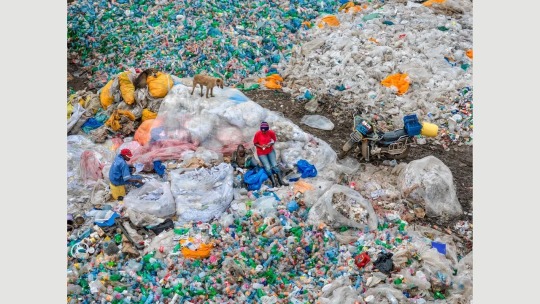
Dandora Landfill #3, Plastics Recycling, Nairobi, Kenya, 2016: among the world's largest (Credit: Edward Burtynsky, courtesy Flowers Gallery, London/Metivier Gallery, Toronto)
“Most people would walk by a dump pile and assume that there’s no picture there,” Burtynsky has said. “But there’s always a picture, you just have to go in there and find it.” One of his famous sequences depicts mountains of discarded tires in California. Another shows mountains of poached ivory being burnt. Waves of rock curve into an unsettling symmetry in his photo of Chuquicamata, one of the world’s largest open-pit mines. There is dark irony in his radically anti-idyllic view of the world.

Chuquicamata Copper Mine Overburden #2, Calama, Chile, 2017 (Credit: Edward Burtynsky, courtesy Flowers Gallery, London/Metivier Gallery, Toronto)
Nobel Prize winner Paul Jozef Crutzen has popularised the idea of the Anthropocene, a geological age dominated by human activity. For a New Multimedia Anthropocene Project, Burtynsky visited 20 countries over five years. He argues that “we are on the cusp of becoming (if we are not already) the perpetrator of a… major extinction event”. This is made stark in the unnatural colour of a phosphor tailings pond in Florida: regions where phosphate – essential to industrial agriculture – is mined are typically unable to revert back to their natural state because of pollution. “Let me ask you a question,” asked Burtynsky in a 2016 Facebook Post: “when was the last time you talked or heard or even thought about phosphorus?”

Phosphor Tailings Pond #4, near Lakeland, Florida, USA, 2012 (Credit: Edward Burtynsky, courtesy Flowers Gallery, London/Metivier Gallery, Toronto)
“Scientists do a pretty terrible job of telling stories, whereas artists have the ability to take the world and make it accessible for everyone,” argues Burtynsky. According to his new book Anthropocene, it is estimated that it currently takes 60 billion tonnes of material annually (biomass, fossil energy carriers, metal ores, industrial and construction minerals) to feed humanity’s global metabolism. Burtynsky’s images offer a disturbing insight into how we’re consuming the Earth at an alarming rate – as well as giving a sense of the scale at which we’re dumping it back out, in giant heaps, streams, and lagoons.

Morenci Mine #1, Clifton, Arizona, USA, 2012: primary copper producing region in the US (Credit: Edward Burtynsky, courtesy Flowers Gallery, London/Metivier Gallery, Toronto)
In images like that of the Morenci Mine – showing copper smelting in Arizona, with ponds holding liquid reserves of the effluents left by the extraction process – Burtynsky can tell stories that largely remain out of the mainstream, with an immediacy missing from lengthy articles. His aerial shots are graphic reminders of something that many choose to ignore. In Nigeria, poor communities have begun pirating crude oil from the pipelines through a process known as ‘bunkering’. Makeshift micro-refineries are set up to convert the crude into fuel. These systems leak volumes of crude and toxic by-products into the surrounding forests and waterways.

Oil Bunkering #1, Niger Delta, Nigeria, 2016 (Credit: Edward Burtynsky, courtesy Flowers Gallery, London/Metivier Gallery, Toronto)
Burtynsky categorises himself as an environmentalist, and has dedicated his life to bearing witness to “the indelible marks left by humankind on the geological face of our planet”. In other words, the increasingly ambitious scars and blemishes created by industry and large-scale human habitation, such as the vividly coloured layers from an ancient sea floor exposed by tunnelling machines 350m beneath Berezniki in Russia.

Uralkali Potash Mine #4, Berezniki, Russia, 2017 (Credit: Edward Burtynsky, courtesy Flowers Gallery, London/Metivier Gallery, Toronto)
Burtynsky explores how this is not just a recent development, either. The marble quarries in Carrara have been mined since the time of ancient Rome. This stone was famously used by Michelangelo, who would stay for three months at a time to supervise its removal. The ‘negative architecture’ formed on the land by the quarries is large enough to be seen from space.

Carrara Marble Quarries, Cava di Canalgrande #2, Carrara, Italy, 2016 (Credit: Edward Burtynsky, courtesy Flowers Gallery, London/Metivier Gallery, Toronto)
Burtynsky’s photos of sprawling wind farms and solar installations, on the other hand, document a shift towards sustainability. Equally, the enormous lithium mining and purification operation he captures in the Atacama desert in Chile, however virulent and lurid it appears, looks to a future in which cars powered by lithium batteries enable us to phase out fossil fuels.

PS10 Solar Power Plant Seville, Spain, 2013 (Credit: Edward Burtynsky, courtesy Flowers Gallery, London/Metivier Gallery, Toronto)
Burtynsky also evidently cherishes the bits of Eden that survive. He has recently photographed tracts of virgin rainforest in British Columbia, Canada, and the pristine coral reefs in Indonesia. The coral wall in Pengah is a rare remnant of our globally diminishing coral reefs. Coral bleaching might be more likely to occur there (as elsewhere, such as on the Great Barrier Reef in 2016) should sea water temperatures begin to rise.

Pengah Wall #1, Komodo National Park, Indonesia, 2017 (Credit: Edward Burtynsky, courtesy Flowers Gallery, London/Metivier Gallery, Toronto)
Looking at those pictures makes the soul soar. But they are also a reminder that there is currently no ecology on Earth that isn’t in some way threatened.
0 notes
Text
Government failures and fucked-upperies in France
Ok, so I recently wrote a bit about the situation with police brutality in France, but now I would like to tell you more about WHY the government needs the police so much. A lot of my sources will be in french (and marked (F) like this) because there are a lot of cases that didn’t make it to the international press. Many sources also come from the newspaper Mediapart and require a subscription.
I’ve had a lot of people telling me “BuT It’S nOt ChInA” and let me tell you, yes I know it’s way worse in other countries (Peru, Thailand, Nigeria and so on, a lot is happening right now in the world), but where the fuck do you draw the line? The kind of things I’m gonna tell you about is unacceptable, and so hypocritical when a country calls itself a democracy and the land of human rights, and we should be angry about that and try to make it change. Here I’m talking a lot about Macron but let’s not forget that many current problems began under Holland’s presidency, who was supposed to be from the left, and even before. Alright, here we go.
President of the wealthy
Soooo let’s begin with how Macron was elected by wealthy people: half of the 16 million euro collected for his campaign was financed(F) by 1200 people, mostly living in Paris, by banks, and also by rich french people living abroad. So of course the first thing he did when he could was to reward them for his victory and he cut their taxes in december 2018. He deleted the “taxe on fortune” that was in place for 40 years (minus 3 years under Chirac first presidency) and replaced it with another that taxes way less, in the name of trickle down economy (you know, the same way Thatcher and Reagan did) saying that rich people would invest more and thus creating more jobs. Of course that didn’t happen and rich people just got way richer without any effects on poor people.

At the same time, he cut down housing benefits for students and poor people (1/4 of people between 18 and 24 are under the poverty line) and cancelled housing helps for 50,000 people. In december 2018, he wanted to pass a law that would increase fuel prices in the name of ecology, but that would once again mainly affect working and middle classes. That’s how started the yellow vest movement, because people were becomming poorer and poorer and they felt like the government only gave to the rich and took from the poor.
In 2018, 14% of the french population was under the poverty line, and 21% suffer from food insecurity and it has only worsened since.
At the end of 2019, a student even set himself on fire at his university because he was in such financial distress he couldn’t go on anymore.
Yellow Vest movement
If you have to read one article about it, it’s this one.
In 2017, Macron said in one of his speeches about a train station that it was “a place where one encounters people who are succeeding and people who are nothing”. The yellow vest movement came from these “people who are nothing”. For the first time in decades, people who were not heard, people who didn’t have a place in the political landscape in France were on the front scene. A lot of protestors never demonstrated before, or even engaged in politics. Many of them now protested because “they had nothing else to lose” (F). People were angry from not being listened to and being used only to allow rich people to get richer, and oh boy they showed it in the street.
The first protests took the government by surprise. They were not expecting the numbers of protestors, nor their determination. The protest were also completely different from the demonstration the state was used to deal with: there were no official leaders, making it really difficult for the government to negotiate, demonstrations were often not declared beforhand in prefectures (F), and people were systematically targetting (F) banks, major brands like Apple or McDonalds and luxury shops, causing millions euro worth of damages.
On the 1st of december 2018, protestors in Paris took over the Arc de Triomphe and completely overfloaded the police.
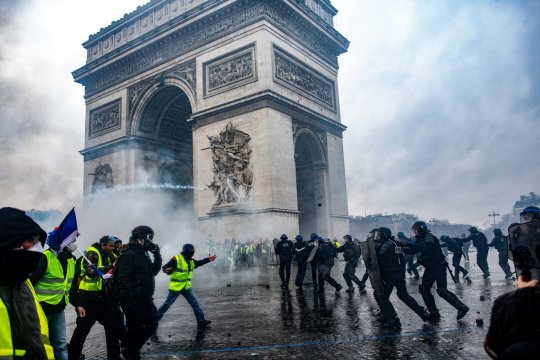
One policeman said afterward that on this day, “the Elysée could have fallen” (F). Police forces were not prepared, the right orders were not given at the right times and some police company were surounded by furious protestors. The same policeman said that in that moment, “they forgot about their code of ethics”, that they were just shooting rubber bullet wherever they could and “trying protect their life”. The following weeks, police put on steel fences around the Elysée and members of the government and their collaborators were asked to lock down and put away all of their documents(F) before the weekly demonstrations, in case the protestors were able to take over the buildings.
It was a turning point in the protests, and from then the orders given to the police changed completely. From then they’ve been allowed to litterally do whatever it took to keep the country in order. The government understood that the last thing between them and the furious people they betrayed was the police, and that’s precisely why they are trying to give them even more power today with the law on global security (see my last post, and probably a next one I’m gonna write soon because it would be too much for this post).
Since December 2018, a journalist, David Dusfresne, documents and keeps count on the police brutality, first on twitter and then on the online newspaper Mediapart(F) (TW for really graphic pictures of wounds and blood). For now he counted 4 deaths, 30 people who lost an eye due mainly to rubber bullets, 6 who lost a hand due to detonative grenades (France is being the only european country to use them against its own population), 346 wounded to the head (fractured skull mainly, due to the rubber bullets and baton blow) and a total of 969 documented reports on police brutality (and that’s only for 3 years).
Since then, a total of 9 police officers have been judged guilty, 7 of them being only suspended temporarily and avoiding prison, with only 2 of them ending up in prison(F) and being expelled from police forces.
People began to record the police more and more to prevent any brutality or to have proofs in case it happened, and then the police began to target journalists and anyone who had a camera.
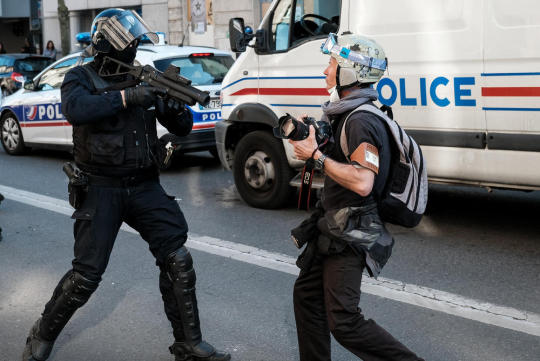
They began to lie to people, telling them it’s forbiden to record the police (for now it isn’t), they forced photographs to delete their photos in the middle of demonstrations. They covered their ID number on their uniform (F), they covered their licence plates.
The government also began to talk about legitimate protest, aka the peacefull one, and put the name of “casseur” (thug) on anyone who would be too angry. to their taste, saying that the latter were taking the former in hostage. Basically they were saying tht yes, protestors took aver the arc de Triomphe, but it was only hooligans who just wanted to burn things, nothing political behind that.
Here began the preventive arrests (F) before demonstrations (arresting people who had done nothing on the only presumption they will), the arrest of journalists, the arrest of people having masks and protection glasses on them. From now on the administration can ban someone from public demonstration without going through the justice system.
Between November 2018 and November 2019, around 3,000 person(F) from the yellow vest movement were senteced to community services, fees, suspended prison sentence, and for 1/3 of them prison sentences. Those numbers are underestimated because many cases have not been judged yet. Some protestors were sentenced for shouting slogans(F), for wearing protective masks(F) (F), other were sent to prison for damaging radars(F) on highways, or for filming riots while wearing a yellow vest(F). There has been a massive tendency(F) for the state to sue people for “participation to a gathering with the intent to commit violences against persons or goods”, allowing them to give fees, community services or even prison sentences to people based only on the intent they gave them. Many people found guilty of attacking police forces were judged with the only proof being the declaration of police officers, and even though a lot of them claimed to be innocent they were still sentenced because they couldn’t bring proof of their innocence.(F) Amnesty International talks about the criminalization of demonstrators(F) that’s happening in France and warns about the instrumentalisation of laws that goes against international law. (F)
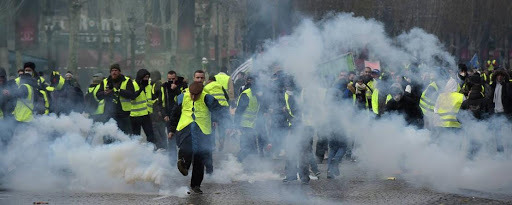
The ban on masks (they can be considered as weapons) during demonstration allows police to take protestors(F) who have some on them or in their car to the police station for a maximum of 48h for the sole purpose of making them miss the demonstration. This law is not applied nowadays because of Covid, but it still exists.
With the yellow vest movement, the part of the population who wasn’t used to the police actually began to endure what POC have been living for decades.
Racisme
France is a fucked up racist country. It was born in colonisation and slavery, and still rely on its former colonies to prosper economically. Young men perceived as Black or Arab are 24 more times likely to be stopped in the streets. The overwhelming majority of people killed by the police are black or arabic(F). When the police kills POC, the judiciary system often refuses to do a full investigation, refuses to hear some of the witnesses, refuses to watch some of the video tapes from surveillance cameras (F). A lot of autopsies are proved to be ballant lies, founding heart diseases(F) or blood infections(F) when the victim was actually killed by suffocation due to ventral tackle, a police technique that got France sentenced by the European court of human rights (F).
BAC
Since the mid 90′s, France has special police forces for working-class neighborhoods, the Brigade Anti-Criminalité (BAC), that operate in suburbs (in France rich people live in the city center and poor people in the suburbs) where a majority of imigrants and people from black and arabic descent live. BAC agents are all volunteers, they act in unmarked cars and civilians clothes and can carry weapons(F).
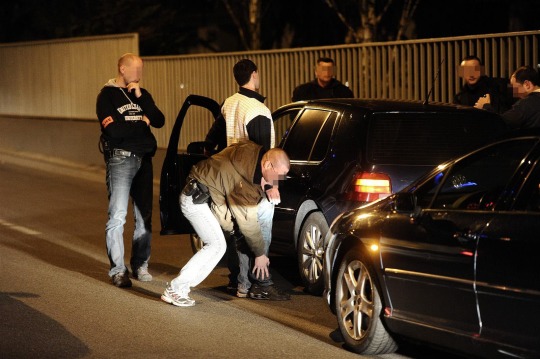
Their purpose is to roam the streets and to catch misdemeanor in the act, and they’ve been known (as well as regular police) to harass population by proceeding to systematic identity cheks(F) (often outside of what’s allowed by law), by insulting people(F), provoking people with racist and homophobic insults(F), by beating them(F) and charging them for “outrage” or “rebellion”(F) when they protest (charges that always give reasons to police officers when there’s no recordings of the arrest and allow them to get money for the prejudice). There have been reports of torture on adults(F), tennagers(F) and children(F), and cases where the BAC agents took victims to quiet places so they could beat them up(F). There have also been reports of agents inventing charges when their provocations didn’t push the victim to confront them(F).
They are basically above the law. There have been cases of massive corruption(F) where the agents returned to their unit(F) after the end of their suspension, and the person who leaked the info got fired.
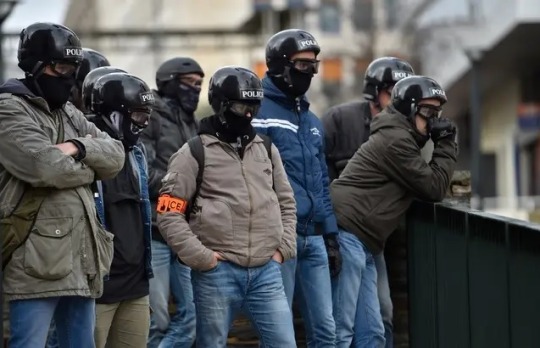
As they are field agents, their role is also intelligence: they gather intells in the suburbs and they also infiltrate demonstration(F) and wear the attire of “casseurs”, to gather intells on violent individuals. Since the beginning of the Yellow Vest movement, they’ve participating in containing demonstrations as well even though they don’t have any training in that field.
Refugees
Police is being extremely violent against refugees, particularly in Northern France and what used to be the “Jungle” of Calais. Amnesty International reported that police had been beating refugees with baton, confiscating their clothes and tent daily during winter (it also happened in Paris(F)), urinating on their tents, spraying teargas directly in the face of sleeping men. A group of 4 associations also issued a report(F) on police harassment against volunteers who helped refugees, with as much as 646 instances of police harassment and abuse against volunteers between November 2017 and June 2018 in Calais. Human rights observers reported harrasment techniques such as body search of female volunteers by male officers, insults, pushing, threats of legal suits and threats of arrest. Volunteers who reported these behaviours were told by the police internal investigation body that the reports where defamatory and could constitute a crime.
At the beginning of the year, associations that were not approuved by the state were forbidden to distribute free meals to refugees(F).
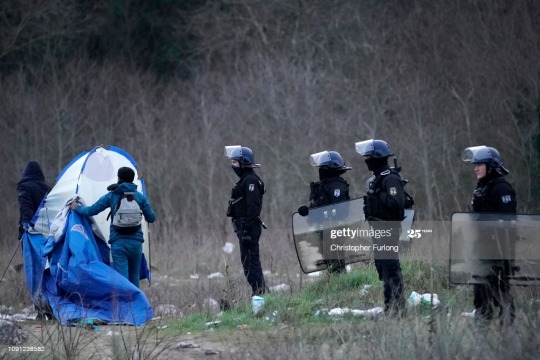
Islamophobia
France has always been an islamophobic country but it has been more public and accepted since the 2015 terrorist attacks. Many laws promoting laicity are actually used to target Islam:
The ban of public display of religious items in public institutions (schools, libraries, government buildings) target mainly women wearing hijabs when many mayors keep on installing nativity scenes during Christmas(F). In 2016 some cities made wearing a burkini (full body covering bathing suit) on the beach illegal and we had some astonishing scenes of police officers asking a women (who wasn’t even wearing a burkini) to undress on the beach in the name of the law.
The law that says people have to uncover their face when being in a public space only target muslim women and is now completely useless as we have the obligation to wear a mask everywhere
The law that says street prayers have to be autorized in prefecture beforehand only target muslim community: when a muslim association organized a street prayer(F) in 2017 to protest their eviction from their place of cult in the city center they were charged 10,000€ (5,000€ from the association and 5,000€ from its president), whereas catholics students organized a street prayer(F) last month and didn’t face any charges. Legally, any autorization must be asked more than 3 days in advance and in both cases it was only asked on the day before.

Following the killing of Samuel Paty, a teacher who was attacked mid october for showing caricatures of the prophet Mohamed in class, four 10 years old children were arrested for “terrorism apology”(F), interrogated for 10 hours and their houses checked by police forces in full gears. The minister of interior also disolved the Collective against Islamophobia in France, saying that, since it was prottesting against anti-terrorist laws (that are super islamophobic) it was promoting radical islamism and terrorism. A minute of silence was imposed in schools and the names of people who didn’t follow the procedure were given to the minister of education, who said “none of them will be left unpunished”.(F)
To sum up: the government is being super islamophobic but muslims who voice their concerns are seen as radical islamists and are associated with terrorists. Furthermore, it’s now easier for islamophobic people in government to ban associations or to pass shady laws thanks to the state of emergency.
State emergency
Following the 2 years of state emergency (2015-2017), France passed a law against terrorism(F) that normalized a lot of the state emergency’s characteristics: it took power away from the justice system to give it to administrations, directly under the control of the government.
The government, who previously had to be accountable in front of a judiciary judge, can now do many things under the only control of an administrative judge(F). The actions of administrative judges are controled by the council of state, and the president of the said council is the prime minister or the minister of justice, named by the president.
Here is what they can now do(F):
place people under house arrest with obligation to check in police stations every day for a maximum of a year
deny or restrict access to public events to some people, or proceed to body search
make someone wear an electronic bracelet when they didn’t commit any infractions
close places of worship for a maximum of 6 months when the ideas discuted there promote hate, discrimination, violence or terrorism
require people to give their login of any account on internet to the police
investigate on civil servants using secret services files
create a national centralized file with the names of people travelling in and out of the country by plane or boat
With the autorisation of a judge of freedom and detentions, they can also search houses and seize computers or phones to inspect the contents.
If people refuse to do any of the above when they are asked to, they risk 3 years of prison and a fee that can go up to 45,000€.
The offense “terrorism apology” was used against hundreds of people, with a large proportion of them being underaged (1/3 of them in 2015), sometimes for something as unsignificant as a non-violent facebook comment, a situation pointed out by Amnesty International(F). The NGO also highlights the fact that the fear of being considered as an extremist or the fear of facing judiciary consequences sets limit to freedom of speech.

Since 2015, the government has used the power given to them by the state of emergency to place 24 environmental activists under house arrest for the duration of the COP21(F) and to search the house of people who were protesting against the construction of an airport(F), construction potentialy linked to corruption(F), and also to close temporarly more than 30 mosques and install security cameras inside(F).
The consulting national commission on human rights pointed out a “highjack” of the state emergency, that was used to silence protestors, unions and refugees with abusive means, like unnecessary handcuffing, adults and children being aimed at with assault riffle during house searches and house being damaged during searches.
2015 was also the year of the Intelligence Act, a law that allows inteligence agencies to install scanning devices on the infrastructure of telecom operators so they can collect data on communications that are likely to reveal a terrorist threat.
Covid 19
When the epidemy started to be problematic in France in February 2020, hospital workers had been on strike for 11 months(F) and were asking for doctors and nurses jobs opening, and more beds in hospital. At the beginning of february, 600 administrative hospital workers had quit(F) so they were not “accomplices of the management of misery”. Healthcare workers had been saying for years that the deterioration of the working conditions in hospitals were gonna lead to patients death.
Since the beginning of the 2000′s, 100 000 beds have been removed(F) from hospital services and there has been a budget cut close to 12 bilions euros(F) for the health services.

Then comes Covid 19, and the government asks health workers to always do more with less, in the name of common good. We applaud them at our windows every night, and then they don’t get the bonus(F) the government promised, the healthcare system doesn’t get any budget increase and even worse, it still has to face a 800 milions cut in the middle of the pandemic(F).
The newspaper Mediapart issued a report(F) exposing the lies of the government:
They decided to get only small quantities of masks at the beginning of january against experts opinion, they said the virus wouldn’t reach France.
Government lied about the usefullness of masks to prevent people asking for them when they didn’t have some to distribute to the whole population. They said it was useless, and even dangerous because we didn’t know how to use them, they actively encouraged people not to wear them, and they lied about mask shortage. I really want to insist on that point, the instensity of communication on the subject was incredible. Every day we had many different high-ranked person in the government telling us on TV, on the radio or in newspaper that we shouldn’t wear masks. They only made wearing masks compulsory in public spaces mid July, 6 months after the first case in France(F).
Healthcare workers didn’t have enough masks and thus faced higher risks of contamination but the government still allowed non essential big companies like Airbus to use milions of the precious FFP2 masks. The government still refuses to give the number of healthcare workers who died from Covid19(F), the only count we have is made by journalists, and it’s believed to be underestimated.
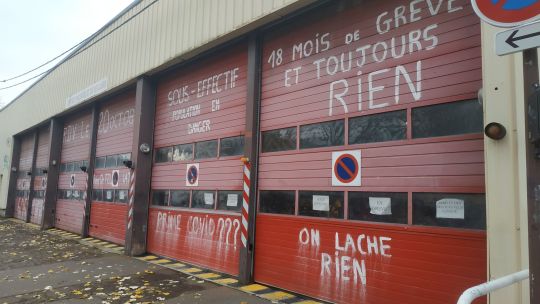
To this day, healthcare workers are still on strike for better working conditions and better pay. I took this pic earlier this month from one of the firestations in my city, you can read written in white paint on the doors “understaffed, population in danger”, “18 months of strike and still NOTHING”, “Covid bonus ???” and “SOS”. Firefighters also write this on their trucks and their helmets, and hospitals have had banners deployed for more than a year now. All of these people are still working to ensure everyone’s access to health services but they refuse to transfer data to the state sickness insurance for example (and they are now facing administrative sanctions(F) and are threatened to not be given cancer drugs if they don’t end the strike(F)).
Regarding Covid, we are one of the only countries in europe to use self-filled certificates to be able to go outside. These certificates are controlled by the police, and like I said earlier, increased police controls harm a certain part of the population (young people and POC). Amnesty International issued a report(F) on the violences comited during french lockdown, pointing out repetitive and significant illegitimate actions from the police, such as beatings, use of tasers, illegal arrests, racists and homophobics insults and verbal threats. In April 2020, Mohamed Gabsi, a homeless person, was killed by the police after being arrested for being outside during the lockdown(F). The officers who killed him are still in service.
The covid crisis brought us in the worst recession we had since WW2, and the Secour Populaire (french association that helps poor people) had to help 45% more people than it helped in 2019(F). In my city, there are so many people coming for food distribution on certain days they had to install permanent fences in the street so people can queue in order.
Corruption and Other Stuff
In France (as in many other countries) it’s rare to have politicians who’ve never been prosecuted in any judiciary or administrative case.
Here I’m only gonna tell you who have been accused and who have been prosecuted for what in Macron’s government, and quite frankly it’s not exhaustive because one wikipedia page just brings me to 5 more.
The following tab is quite heavy so feel free to just check the left column with the legend.
(Now let me cry thinking about this Swedish minister who had to quit over a chocolate bar)

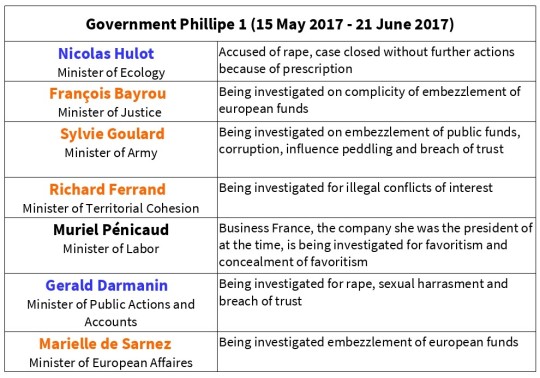
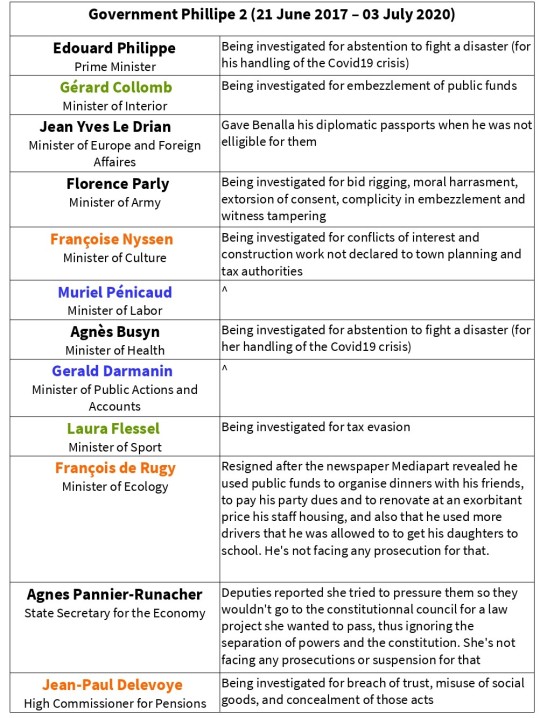
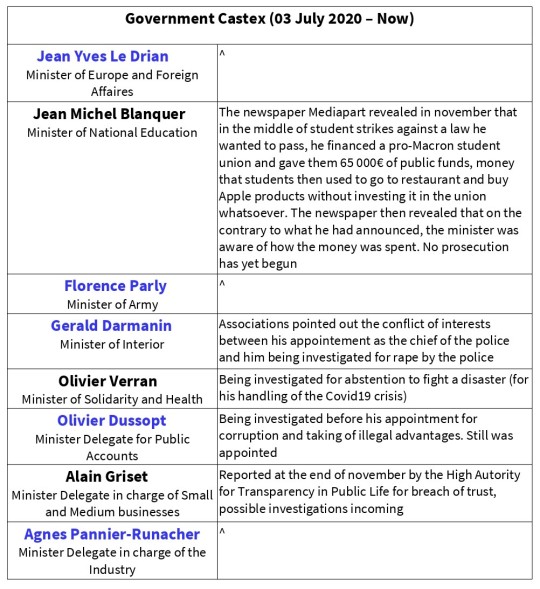
(All my sources are from french newspapers, I can give them if you ask me but I’m not gonna put them here because there are way too many)
People who had to quit the first government were still appointed deputy governor of the Bank of France (Sylvie Goulard), president of the national assembly (Richard Ferrand) and chief of foreign affaires commission at the national assembly (Marielle de Sarnez). They are being investigated for corruption and embezzlement and they still have a successfull political career, and more important they still heavily influence the laws of our country and of Europe. Sylvie Goulard was even chosen by Macron to seat at the European Commission but european deputies decided it was fucked up and rejected her appointment (F).
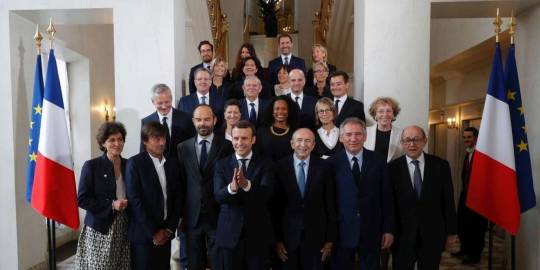
In this list I only talked about members of the government but there has been other scandals linked to people around Macron.
Benalla cases: It all began when we discovered Alexandre Benalla, chief of security and travels for the president, was participating in demonstration as a policeman (which he wasn’t) and used his position to beat up protestors and passerby. The rest of the case is filled with destruction and hiding of evidences(F), illegal sharing of public surveillance videotapes by the police, undeclared guns(F), illegal but unpunished use of data by the police(F) and the Elysée(F), breaking of the judiciary control by Benalla, illegal diplomatic passports and meeting with african’s leaders, russian contracts with an alleged mafia boss(F), office searchs for a newspaper ordered by the State, who tried to seize the proofs and the sources the newspaper had on the case(F) and so on. The case involves several members of the government and members of special forces, and some journalists who were writing on it were then auditionned for disclosure of state secret(F). The case in general highlighted the impunity members of the government and police officers have, as well as anyone who is close to the president, but also the dysfunction in the justice system and the impossibility for high ranked people to face justice. The fucker is still free, taunt people on twitter and still gives interviews to national television.
Kohler case: Alexis Kohler, general secretary of the Elysee and Macron right hand man during his campain, hid his personnal links to the sea transporters MSC and then attributed them huge state funds. He also lied in his involvement in the decision. We discovered Macron sent a letter to the national financial prosecutor's office to clear him, which they did, until an anti-corruption association relaunched legal proceedings. The guy is now being prosecuted for corruption and bribery. (F) (F)
Conclusion
Fuck the police, eat the rich, let’s forbid them from being elected, a next long post on the Law on Global Security the governement is trying to pass is gonna come soon if you’re interested.
Please tell me if you see any inconsistency in this post, I tried to source it as much as I could and to verify everything I wrote but like anyone else I have bias and sometimes I wrote things at 5am so I’m aware I might be incorrect and I’m open to constructive criticism. Also sorry for my approximate english sometimes.
#France#Macron#up the baguette#yellow vest#what the france#french government#french politics#french side of tumblr
59 notes
·
View notes
Text
Lionheart


youtube
The Nigerian film Lionheart was directed by Genevieve Nnaji who also plays the main character, Adaeze Obiagu, and was released in 2018. The story follows a family transportation business in Enugu, Nigeria. The company, Lionheart, is run by Adaeze’s father, Chief Ernest Obiagu, who suffers a mild heart attack early on in the film. While he recovers, he appoints his brother, Chief Godswill Obiagu, as acting head of the company, instead of Adaeze. This frustrates Adaeze who thought she was going to take over the position. The rest of the movie shows Adaeze and Godswill’s relationship with each other as they struggle to get their company out of debt by working together.
Lionheart touches on the gender dynamics and public transportation issues in Nigeria, as well as sexism in the workplace. I included this film in our festival project, not only because it sheds light on interesting transportation issues and gender dynamics in Nigeria, but also because it has a few scenes that relate to gender and space in a city which can be compared to Doreen Massey’s theoretical text, “Space, Place, and Gender.”
As noted in our introduction, Nigeria has faced a lot of government conflict and power shifts throughout its history. This history of conflict has led to a general attitude of distrust in government provided public services like infrastructure and public transportation. This distrust has led to the people of Nigeria taking matters into their own hands, which is where the birth of the Lionheart transportation company comes from in the film. Within the first 10 seconds of the film, which are shot on a Lionheart company bus, a radio can be heard in the background with a broadcaster discussing the public need for new development and public transportation in the country of Nigeria. At the end of the film, Adaeze and Godswill save their company, which covers transportation in the southeast of Nigeria, by merging with Maikano Motors, which is a transportation company that exists in northern Nigeria. Through this merger, it is clear that private transportation companies have taken traffic infrastructure and public transportation into their own hands in response to the lack of action from the Nigerian government.
In relation to gender and sexism in the workplace, Lionheart offers a very modern take on the issues many women still face in the workforce today. For example, although Adaeze is barred from taking on her father’s position as head of the company, she is reassured by her mother that his reasons have nothing to do with her being a woman (Lionheart). Additionally, later we find out from her father that he decided not to make her acting head of the company in order to teach her an important life lesson about how, in life, things don’t always go as you plan (Lionheart). However, despite these assurances that her job title isn’t affected by her gender, Adaeze still faces multiple instances of sexism throughout the movie. The first apparent example in the film is when Godswill comments on how much she’s grown up recently and how she “could go for a beauty contest and win,” to which she replies, “thank you, I have my hands full with the company” (Lionheart). Additionally, when Adeaze and her uncle are attempting to acquire a loan for the company, one of the bank workers stares at her chest the entire time she talks, and another worker asks to sleep with her as payment for the risky loan. Both of the instances enforce the historically social idea that women are not meant to occupy the business world. In Doreen Massey’s, “Space, Place, and Gender,” she talks about how some spaces are gendered. She discusses how “they are gendered in a myriad different ways, which vary between cultures and over time. And this gendering of space and place both reflects and has effects back on the ways in which gender is constructed and understood in the societies in which we live” (Massey 186). Lionheart reflects this idea as it shows that, despite the progressive atmosphere that Adaeze lives and works in, she still faces sexism in the workplace which has been gendered as a male space throughout history.
11 notes
·
View notes
Text
Friday, May 7, 2021
60 years since 1st American in space: Tourists lining up
(AP) Sixty years after Alan Shepard became the first American in space, everyday people are on the verge of following in his cosmic footsteps. Jeff Bezos’ Blue Origin used Wednesday’s anniversary to kick off an auction for a seat on the company’s first crew spaceflight—a short Shepard-like hop launched by a rocket named New Shepard. The Texas liftoff is targeted for July 20, the date of the Apollo 11 moon landing. Richard Branson’s Virgin Galactic aims to kick off tourist flights next year. And Elon Musk’s SpaceX will launch a billionaire and his sweepstakes winners in September. That will be followed by a flight by three businessmen to the International Space Station in January.
The U.S. birthrate is falling; other countries have faced the same problem
(Washington Post) With the U.S. birthrate declining for the sixth year in a row and undergoing its largest drop in nearly 50 years, according to provisional data released Wednesday by the Centers for Disease Control and Prevention, the United States is facing a dilemma with which many wealthy nations in Europe and Asia have long grappled. Instead of trying to ramp up immigration, some governments have tried subsidizing fertility treatments, offering free day care and generous parental leave, and paying thousands of dollars in cash grants to parents. But there’s little evidence that these policies have been effective on a large scale. South Korea, for instance, spent roughly $120 billion between 2005 and 2018 to incentivize having children, but its birthrate continued to fall. Singapore began offering new child-care subsidies, more-generous maternity leave policies and grants for new parents that today amount to $7,330 per baby. But those interventions didn’t reverse the trend: Singapore currently has the world’s third-lowest fertility rate. And Japan, Russia, Estonia and other nations have similar problems.
Protest road blockades halt Colombian coffee exports, federation says
(Reuters) Road blockades connected to anti-government protests in Colombia, which marked their eighth day on Wednesday, have halted shipments of top agricultural export coffee, the head of the grower’s federation said. The protests, originally called in opposition to a now-canceled tax reform plan, are now demanding the government take action to tackle poverty, police violence and inequalities in the health and education systems. Twenty-four people, mostly demonstrators, have died. “We are stopped completely, exports are stopped, there is no movement of coffee to ports nor internally,” federation head Roberto Velez said in a phone interview.
20 dead in Rio de Janeiro shootout
(Reuters) At least 20 people, including a police officer, died on Thursday in a shootout during a police operation against drug traffickers in Rio de Janeiro’s Jacarezinho shanty town, O Globo newspaper reported on its website. Two passengers on a metro train were also wounded in the shooting in the northern Rio neighborhood, the newspaper said.
Gunboats and blockade threats as U.K., France clash over fishing
(NBC News) The U.K. and France were engaged in a naval standoff on Thursday as a long-simmering dispute over post-Brexit fishing rights escalated in the English Channel. France deployed two maritime patrol boats to the waters off the British Channel island of Jersey, its navy said, after the British Navy dispatched two of its own vessels to the area late Wednesday. The dueling moves came as a flotilla of French fishing trawlers sailed to the Jersey port of St. Helier to protest over fishing rights. The French government has suggested it could cut power supplies to the island if its fishermen are not granted full access to U.K. fishing waters under post-Brexit trading terms. Clément Beaune, the French secretary of state for European affairs, told AFP on Thursday that Paris will “not be intimidated” by the British. On the other side of the Channel, British Prime Minister Boris Johnson pledged his "unwavering support" for the island after he spoke with Jersey officials about the prospect of a French blockade. Jersey, the largest of the Channel Islands with a population of 108,000, is geographically closer to France than Britain. It sits just 14 miles off the French coast and receives most of its electricity from France via undersea cables.
Ukraine wants aid, NATO support from Blinken’s visit
(AP) U.S. Secretary of State Antony Blinken met with his Ukrainian counterpart in Kyiv Thursday, telling him that he was there to “reaffirm strongly” Washington’s commitment to Ukraine’s “sovereignty, territorial integrity and independence.” Blinken also assured Ukrainian Foreign Minister Dmytro Kuleba that the U.S. was committed “to work with you and continue to strengthen your own democracy, building institutions, advancing your reforms against corruption.” By visiting so early in his tenure, before any trip to Russia, Blinken is signaling that Ukraine is a high foreign-policy priority for President Joe Biden’s administration. But what he can, or will, deliver in the meeting later with President Volodymyr Zelenskyy is unclear.
India hits another grim record as it scrambles for oxygen supply
(AP) Infections in India hit another grim daily record on Thursday as demand for medical oxygen jumped seven-fold and the government denied reports that it was slow in distributing life-saving supplies from abroad. The number of new confirmed cases breached 400,000 for the second time since the devastating surge began last month. The 412,262 cases pushed India’s tally to more than 21 million. The Health Ministry also reported 3,980 deaths in the last 24 hours, bringing the total to 230,168. Experts believe both figures are an undercount. Eleven COVID-19 patients died as the pressure in the oxygen line dropped suddenly in a government medical college hospital in Chengalpet town in southern India on Wednesday night, possibly because of a faulty valve, The Times of India newspaper reported. Hospital authorities said they had repaired the pipeline last week, but the consumption of oxygen doubled since then, the daily said.
Israeli opposition leader Yair Lapid gains chance to form government, oust Netanyahu
(Washington Post) Yair Lapid, a former news anchor and leader of Israel’s centrist opposition, was picked to negotiate a new governing coalition Wednesday, opening the possibility of Israel getting its first government not led by Prime Minister Benjamin Netanyahu in more than a decade. President Reuven Rivlin tapped Lapid to make the next attempt to form a government one day after Netanyahu failed to assemble a parliamentary majority after 28 days of effort. Under Israel’s system, Lapid also has four weeks to craft a power-sharing plan. If he falls short, the president could open to the process to any member of the Knesset or call for Israel’s fifth election since the spring of 2019. Lapid will face a stiff challenge in trying to find common ground among the range of anti-Netanyahu parties elected in March. As a bloc, they would control enough seats to secure a majority. But ideologically, they range from the far right to the far left of Israel’s political spectrum. They also include Israeli Arab parties that traditionally play no part in supporting governing coalitions but that may be needed this time.
Instagram fuels rise in black-market sales of maids into Persian Gulf servitude
(Washington Post) The advent of Instagram in recent years has helped create an international black market for migrant workers, in particular women recruited in Africa and Asia who are sold into servitude as maids in Persian Gulf countries. Unlicensed agents have exploited the social media platform to place these women into jobs that often lack documentation or assurances of proper pay and working conditions. Several women who were marketed via Instagram described being treated essentially as captives and forced to work grueling hours for far less money than they had been promised. “They advertise us on social media, then the employer picks. Then we are delivered to their house. We are not told anything about the employers. You’re just told to take your stuff, and a driver takes you there,” said Vivian, 24, from Kenya. Domestic servants sold on the platform described encountering threats, exploitation and abuse. The agencies which marketed them, meanwhile, made thousands of dollars. In response to a request for comment last month, an Instagram spokesperson asked for the list of accounts identified by The Post so company officials could investigate. Instagram has since deleted these accounts.
Nonuplets: Woman From Mali Gives Birth To 9 Babies
(NPR) A Malian woman has given birth to nine babies, in what could become a world record. Halima Cissé had been expecting to have seven newborns: ultrasound sessions had failed to spot two of her babies. "The newborns (five girls and four boys) and the mother are all doing well," Mali's health minister, Dr. Fanta Siby, said in an announcement about the births. Professor Youssef Alaoui, medical director of the private Ain Borja clinic in Casablanca where Cissé gave birth, said the babies were born at 30 weeks. The newborns weighed between 500 grams and 1 kilogram (about 1.1 to 2.2 pounds), he told journalists. The clinic has deployed a team of around 30 staff members to aid the mother's delivery and care for her nine children.
Nigeria reels from nationwide wave of deadly violence
(The Guardian) Nigeria’s president Muhammadu Buhari has come under mounting pressure from critics and allies alike as the country reels from multiple security crises that have claimed hundreds of lives in recent weeks. An alarming wave of violence has left millions in Africa’s most populous country in uproar at the collapse in security. Attacks by jihadist groups in the north-east have been compounded by a sharp rise in abductions targeting civilians in schools and at interstate links across Nigeria. Mass killings by bandit groups in rural towns, a reported rise in armed robberies in urban areas and increasingly daring attacks on security forces by pro-Biafran militants in the south-east have also all risen. In April alone, almost 600 civilians were killed across the country and at least 406 abducted by armed groups, according to analysis by the Council on Foreign Relations. The violence has left much of the country on edge and Buhari facing the fiercest criticism since he took office.
2 notes
·
View notes
Text
The Innovative rise of Contract Management and Digital Signature: INHUBBER
So recently, I met someone from a cybersecurity webinar hosted by a top firm in the technology industry and we engaged in conversation. Raul is an employee of a business startup in Madrid, Spain. His company had been looking for a Cybersecurity consultant for a security audit of their company. After discussing with him for some days on the project, I had an interview with his employers and I got the job! It was great, I could offer my services to the success of a business but there was one problem.
How would we manage this?
I’m a Cybersecurity Professional in Nigeria working with a business in Spain, that's a lot. We needed a way to establish our contract seamlessly, a way to trust each other to agree to the terms that we had set, and that's when I remembered I had stumbled on a company page at a time in the past while checking businesses on LinkedIn, right now I’m so glad I could remember;

Letting your contracts work for you
INHUBBER is a contract management and handling company in Berlin, Germany. I visited their website at https://inhubber.com/en/ and I had the perfect first impression of this company and the services that they offer.
INHUBBER is a Blockchain and AI digital signature management and contract management system based on SaaS. INHUBBER was founded by a group of researchers at the Humboldt University of Berlin, it simplifies and makes contracts understandable, interactive, and easy to maintain. It reduces the time, costs, and dangers connected with contract negotiation, creation, approval, and management. Just to give this organization more praise, it was founded in 2018 to be precise from an R&D project to no surprise. INHUBBER has received two competitive grants and has evolved into a software company specializing in cloud-based Contract Management and digital signature solutions, and that's not all!
By now, INHUBBER offers a digital signature, a repository, and an audit trail at the highest security level. The company is co-financed by the European Regional Development Fund [EFRE] and to encourage research, innovation, and technology, it is sponsored by the State of Berlin as part of the ProFIT program. The use of blockchain saves costs, increases transparency, compliance, security and the implementation with AI makes it even better. It's a delight to see that a company has been able to identify an obvious need and has the services to effectively deliver and meet this need with an absolute touch of perfection.
Blockchain and AI Technology are a pair that isn't perfected by some companies that make use of it, but with INHUBBER, it is a completely different story. It makes use of an E2E encrypted vault for contracts to ensure data security. Once secured, contracts can be analyzed with AI. Based on the AI analysis, users can manage their contracts and contractual obligations or let the platform do it for them. AI allows users to ask contextual questions to the documents and Blockchain ensures decentralized security of the entire system. Modern contracts are full of media files such as audio, video, excel, cad, these files can be signed with the platform's native digital signature. The product and service offer is intended at firms of all branches and sizes without major customer group distinction.
INHUBBER delivers an easily customized deadline and milestone management system for firms that want to avoid unwanted automatic contract renewals and automated obligations management.
INHUBBER offers a safe E2E Encrypted document store for companies with cabinet-distributed contracts. Instead of dusting around, the centralized data is set to massively improve their ROI.
INHUBBER supplies an electronic signature to speed up approvals and an immutable audit trail for companies sending back and forth contract emails, which need to be printed, signed, scanned, and sent to the next party.
I would recommend this company for any contract-related matters, either personal or business, they are well equipped for all! Thanks to INHUBBER, I was able to set up an easy-to-manage contract platform with my clients abroad. It was truly a smooth process, all we had to do was to schedule a demo call on their website to begin, and the rest like they say is history.
1 note
·
View note
Photo

A Call for Cultural Courage
Dear Friends,
On opening night of the TED2017 conference, just before headliner Pope Francis took the spotlight, artist Titus Kaphar walked to center stage declaring, "I love museums." Standing in front of a large-scale replica of Dutch master Frans Hals’s seventeenth-century painting entitled Family Group in a Landscape, which depicts a European family and a Black servant set against a country landscape, Kaphar began his talk with a story. It went like this: While Kaphar and his two young sons were on an outing to the American Museum of Natural History, the boys were confronted with the 1939 Equestrian Statue of Theodore Roosevelt outside the museum’s entrance. The sculpture depicts Roosevelt on a horse flanked by two men, one Native American and one of African descent. The boys questioned why one man got to ride the horse while the others had to walk. To the children, this seemed unfair. For Kaphar, it was a seminal moment that stopped him in his tracks—the question reminded him of the portrayals of white-dominated hierarchies that pervade our culture.
Kaphar then posed a question for the TED2017 audience: “Can art amend history?” As he asked the question, he dipped a wide household paintbrush in white paint and began to cover his own painting until all the figures, except the young Black boy in the background, were obscured. The audience collectively gasped as Kaphar forced them to consider the focus of their gaze—and whose histories are seen or made invisible. Kaphar concluded his talk by sharing his desire to create art that "wrestles with the struggles of our past" and, in the process, models how art can contribute to shaping history.
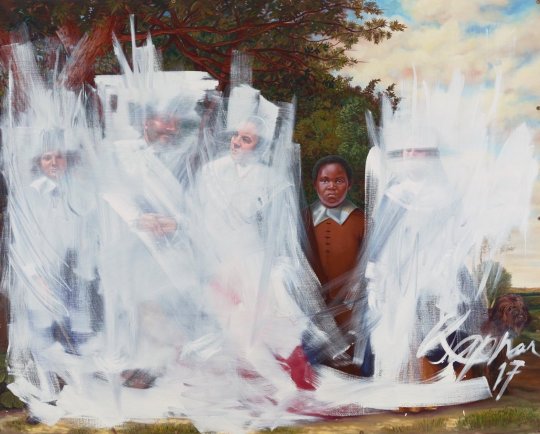
If artists and art can wrestle with the past and amend history, so too can museums. And we must. Museums like the Brooklyn Museum were founded on the fundamental belief that the sharing of world cultures would lead to greater understanding and empathy, thereby advancing civilization. Many of us in the museum field still value this glorious ideal. However, we recognize that museums have also privileged Western white narratives while often diminishing the histories of others. This is important to understand because, for better or worse, museums contribute to the narratives that shape our society, and our society is in great need of more empathy and respect.
At this time of social unrest, people around the globe are using protest to call upon their museums to do better. We can debate the accuracy of information and the effectiveness of the strategy, but like it or not, we shouldn't be surprised by protest. As the President of the Ford Foundation, Darren Walker, recently shared museums are in crisis because America is in crisis. In his recent op-ed in The New York Times, Walker urged museums to do better. Why? Because museums are fundamental pillars of our American democracy and among the few truly public spaces for people to come together, learn, share ideas, and debate; because art has the capacity to inspire empathy; and because people count on museums to confront difficult and important issues with understanding and respect.
So how are we at the Brooklyn Museum striving to do better?
Lots of ways.
First, doing better means understanding that the stories we tell matter. We have therefore made it an institutional priority to present special exhibitions that shine a spotlight on cultural histories that have long been suppressed. For example, we have highlighted issues of systemic racism and have drawn attention to important African American and Latinx artists with exhibitions such as We Wanted a Revolution: Black Radical Women, 1965–85 (2017), The Legacy of Lynching: Confronting Racial Terror in America (2017), Soul of a Nation: Art in the Age of Black Power (2018), and Radical Women: Latin American Art, 1960–1985 (2018). We have looked at issues of gender equity across time in A Woman’s Afterlife: Gender Transformation in Ancient Egypt (ongoing) and Roots of “The Dinner Party”: History in the Making (2017). With David Bowie is (2018), we examined the artist’s liberating embrace of gender and sexual orientation. And with our current exhibition Nobody Promised You Tomorrow: Art 50 Years After Stonewall, we have taken a contemporary look at LGBTQ+ issues. In Frida Kahlo: Appearances Can Be Deceiving (2019), we focused on disability and its impact on the artist’s identity and practice.

In addition to our special exhibitions, we present works from our historical collections in context and in mutual dialogue with the communities they come from. In 2016, we reinstalled our American Art galleries to celebrate our nation’s rich history of immigration. And earlier this year, in the collection installation One: Egúngún, a masterwork from our Arts of Africa collection was displayed alongside extensive new research by the curator of the presentation, who consulted with Yorùbá communities in both Brooklyn and Nigeria to better contextualize the object’s meanings and origins. When possible, we also connect our exhibitions and collection installations to civic organizations devoted to advancing positive societal change that impacts our communities, for example, by partnering with organizations that combat mass incarceration and support the rights of immigrants.
Doing better means becoming Brooklyn’s largest arts classroom by supporting the education of our youth, especially those in our most under-resourced communities. For example, thanks to a grant from the Kenan Foundation, we have partnered with some of Brooklyn’s most financially challenged schools to provide in-school art classes where there were none. Our education programs are also expanding the number of young people who visit the Museum every year with their schools, caregivers, and camps. We have grown our programming for teens, especially LGBTQ+ teens and teens of color. And doing better means supporting creative learning with teacher training and resources to bring the Museum into school classrooms throughout the City.
Doing better means challenging the historical insularity of museums by broadening partnerships with our communities to provide services that are relevant and that have an impact. Today, the Brooklyn Museum works with hundreds of community organizations each year. We invite local artists, artisans, and community service organizations into the Museum to connect with our hundreds of thousands of annual visitors through public programs, workshops, and other events. We host public school graduations, serve as an election polling site, support funding drives for communities that have suffered from natural disasters, and lend our space to local organizations for meetings. We seek the advice of community members on the presentation of specific exhibitions. For more than 50 years, over Labor Day weekend, we have hosted the City’s single largest celebration of Caribbean culture, organized in partnership with the West Indian American Day Carnival Association, in our parking lot and culminating in a magnificent parade that ends at our front plaza. You can expect more as we work to grow these commitments.

Doing better means being financially accessible to all, which means remaining affordable despite the very real challenges of funding a major non-profit cultural institution outside of Manhattan. We are proud to be one of the only major art museums in the City with suggested admission, making it possible for many of our audiences to visit our world-class collections for free. We are also proud that on the first Saturday of every month we offer free programming, musical performances, art classes, and other events from 5 to 11 pm, when the Museum is packed and buzzing with thousands of excited visitors.
Doing better also means looking at ourselves and our operations with the goal of advancing our longstanding institutional commitment to diversity, equity, and inclusion among our ranks. Through the guidance of our new DEI (Diversity, Equity, and Inclusion) Plan we are working to recruit more staff from communities historically underrepresented in museums, including disabled, gender-nonconforming, and transgender people; people of color; and those from varied socioeconomic backgrounds. Thanks to Citibank, we actively support pipelines for jobs in our field by partnering with colleges and universities with diverse student bodies (such as CUNY and HBCUs) to recruit interns. Doing better means working toward greater wage transparency and fairness. And it means continuing our efforts to cultivate diversity on our Board in terms of race, gender, disability, socioeconomic status, and professional background—from artists and scholars to community members and business leaders—who share a passion for our mission. We don’t have all the answers, and our work is not without contradictions, but we push ahead as we always have, because our work matters.

Art—and museums—can amend history. And at such a pivotal moment, shouldn’t that be a priority? Indeed, it’s a priority for us at the Brooklyn Museum. So, today Kaphar’s painting is displayed in the very first gallery of the Brooklyn Museum, setting the tone for our audience's journey as we consider who creates historical narratives and how those narratives serve us. It’s a reminder that great cultural institutions must do their best to contribute to a more equitable and empathetic world.

Anne Pasternak
Shelby White and Leon Levy Director
Brooklyn Museum

Barbara M. Vogelstein
Chairman, Board of Trustees
Brooklyn Museum
#anne pasternak#brooklyn museum#director's letter#brooklyn#cultural change#museums#community#change#titus kaphar#equity#accessibility#cultural institutions#empathetic#society#history#art
354 notes
·
View notes
Text
COVID-19 fuels the threat of global famine
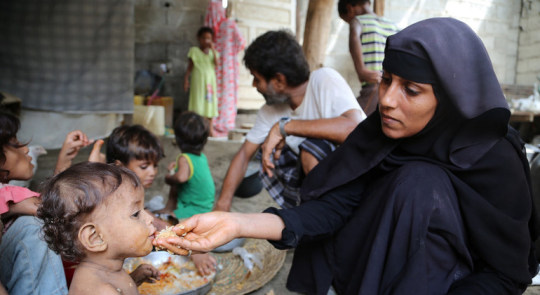
The pandemic has exacerbated food insecurity around the world. The World Food Program is short of resources to alleviate hunger.
Conflicts, climate change and now COVID-19 are the three C’s driving 270 million people to famine in the most impoverished countries in Asia, the Middle East, Africa, Central and Latin America. Officials at the World Food Program (WFP), the hunger relief arm of the United Nations that feeds about a hundred million people each year in some 88 countries, warned that they are running out of resources to meet the demand for staple foods and thus prevent people dying from starvation.
“We are asking globally $13.5 billion for our budget this year, but we forecast being able to raise only about $7.8 billion,” said Steve Taravella, WFP’s senior spokesperson at a briefing organized by Ethnic Media Services on Feb. 26.
Before the pandemic, there were about 135 million people acutely hungry in the world, but the collateral economic impacts of the virus have doubled that number. WFP estimates that in 2021, about 19,000 officials working in developing countries will have to duplicate efforts to serve at least 120 million people, in hardest-hit places like Yemen, South Sudan, Nigeria and Burkina Faso.
“For some years WFP and others working on global hunger were really effective in bringing hunger down to what we hoped would be the zero hunger goal of the UN by 2030. It’s pretty clear now, that’s not going to happen,” Taravella said. “COVID is making the poorest of the world poorer and the hungriest of the world hungrier.”
WFP won the Nobel Peace Prize last year for its efforts to eradicate hunger in areas where natural disasters and conflict have disrupted normal food distribution channels. Areas where bombed roads prevent trucks carrying flour, rice, lentils, peas, cooking oil and salt from getting through. Areas where airstrikes destroy planes carrying dietary supplies. Areas where incessant fighting prevents hungry people from venturing out for food or aid workers from moving safely to provide it, at a time when crops cannot be harvested.
“There have been terrorist acts against villagers and aid workers by Al-Qaeda Al-Shabaab, Boko Haram and ISIS,” Taravella said. Recently, a WFP staff member was killed in the Democratic Republic of the Congo while accompanying the Italian ambassador on a visit to a school feeding site.
WFP provides school meals in the classrooms, helps pregnant women and new mothers to understand nutrition, and supports small farmers to find markets for their produce.
“We work very closely with governments but we see ourselves there only as a temporary band-aid. Our goal is to help build the country’s capacity to manage the programs,” said Taravella.
Although the WFP does not operate food banks in the United States, immigrants in the country have contributed greatly to alleviating hunger in their homelands after natural disasters such as the typhoon that devastated the Philippines or the hurricanes in Central America. But COVID has also impacted remittances.
Devastating hurricanes
“When COVID hit, we were really hoping that the hurricane season will be a quiet one as we had a few years ago, but that was not the case,” said Elio Rujano, communications officer for the WFP’’s regional bureau for Central America and the Caribbean.
The 2020 season produced 30 named storms, of which 13 became hurricanes, six of them devastating in scope. Eta and Iota ravaged areas in Guatemala, Honduras and Nicaragua while tropical storm Amanda hit El Salvador. Since 2014, these countries have already been experiencing prolonged periods of droughts or excessive rains caused by the El Niño phenomenon, both causing the destruction of crops and the livelihood of farmer families.
“In the past we were only focusing on the dry corridor where rural farmers live, but now, because of the pandemic, hunger has expanded to urban areas,” Rujano said from his Panama City office. “50% of the labor in Latin America and Central America is informal labor. People work on the streets, and since they could no longer go out, they couldn’t meet their basic needs.”
Back in 2018, hunger in the region was affecting 2.2 million people and that number is approaching nearly 8 million in 2021.
Here WFP works to support communities to become more resilient to climate change. They teach them to replace the plantation of fragile products such as beans and maize with beekeeping, since honey can be stored for longer periods. They also provide people with cash transfers to buy food at local shops and teach them about nutrition.
Rujano estimates that they could serve up to 2.6 million people this year if they reach $47 millions in donations to reach that population.
Malnourished children in Yemen
Although the situation in Central America is worrying, in places like Yemen where conflict is the main driver of the hunger crisis, the figures are even more chilling. Since the end of 2018, this country has been described as the home of the world’s largest humanitarian crisis. Six years of war between the Houthi rebels who control the north of the country and the nationally recognized government dominating the south, have devastated infrastructure, destroyed agricultural land, eroded government services and left the healthcare system on its knees.
About 4 million people out of a population of 30 have become internal refugees while food prices are on average 140 times higher than before the war.
“The hunger situation right now in Yemen has hit a new peak,” said Annabel Symington, head of communications for the WFP in Yemen. “The forecast for 2021 is that 50,000 people are already living in famine like conditions, another 5 million are at severe risk of falling into famine and about 11 million people are facing crisis levels of food insecurity,” she added.
Famine occurs when malnutrition is so widespread that people are literally starving from lack of access to nutritious regular food.
WFP assists more than 12 million people in Yemen – its world’s largest operation – delivering flour, pulses, oil, sugar and salt, as well as canned goods for those who do not have immediate access to kitchen equipment such as the case of the internal displaced people.
The conflict has contributed to nearly half of all children under the age of 5 in Yemen facing acute malnutrition, which not only affects their physical and cognitive development, but puts them at risk of death. 11.2 million pregnant or breastfeeding mothers are also malnourished and according to Symington these numbers can be an underestimate.
Mothers are resorting to desperate measures to survive: either they eat less to feed their children or they must choose which of their kids eat.
After COVID, death rates skyrocketed, but as the testing capacity is limited, it is unknown for sure how many people contracted the virus. “The lockdown was lifted quite early because people will starve if they stay at home,” Symington said.
“It is clear that peace is what Yemen needs so we can address the food crisis,” she added.
Migrants in India
In India, the country with the highest number of food insecure people due to its large population (1.3 billion inhabitants), the pandemic worsened the living conditions for domestic migrants.
Almost 139 million people move from rural areas to large cities to work in informal jobs in factories or as street vendors. The coronavirus forced them to go back to their villages, and since transportation was not working, they had to move by foot, facing not only long hours of walking but hunger. The pandemic also disrupted the harvesting season in March and April affecting food supply chains.
“Although the restrictions (due to the pandemic) have been eased out and these people came back to the cities, there are very few jobs due to the economic slowdown,” said from New Delhi Parul Sachdeva, country advisor in India for Give2Asia, an NGO that supports grassroots organizations in 23 countries in Asia Pacific.
“Today 8 in 10 people are eating less food than before the pandemic and nearly 1 in 3 people face moderate or severe food insecurity.”
The government approved a package of US $22.6 billion for the distribution of staple foods during four months and cash transfers of $ 500 rupees (US $ 7) for up to three months. But informal workers were left out of the package, forcing civil society organizations to support those returning to their villages with meals, health supplies and shelter.
Organizations like Akshaya Patra distributed 1.8 million meals a day to children across India. GIve2Asia is now working on economic rehabilitation through training and input costs for agriculture.
“These are the kind of activities we wish to promote,” Sachdeva added. “I think they provide some kind of solution for livelihood regeneration in a country like ours,” she concluded.
You can donate to WFP here or via the Share the Meal app
Originally published here
Want to read this piece in Spanish? Click here
#COVID_19#Global Famine#World Food Programme#WFP#Hunger#Famine#Yemen#India#Central America#Guatemala#El Salvador#Nicaragua#English#Give2Asia
0 notes
Text
Giveaways and the Spammers!!
As soon as Stellar announced a massive airdrop on the encryption app spammers started to appear at Keybase. As soon as they noticed that the free money period ended, they went abroad.
Or so, in a recent interview, Max Mike, CEO of Keybase, explained to CoinDesk.
Lately, there has been talking of a severe spam upturn on Keybase's chat side. The reason is virtually entirely in the collaboration between Keybase and the Stellar Creation Foundation to invest an additional 2 billion XLM on app users over twenty months.
It was an exciting experiment, "said Krohn. "the target got achieved by having enough new numbers on key base and more people on Stellar, at the end."
The issue was that costs began to dominate at some point, as Keybase confirmed when the software came to an abrupt end. On, 13 December, the third and final XLM airdrop started.
Now it is much less what got revealed as a 2 billion XLM donation. "The total amount of donation is going to be about 16,000,000 USD or 300 million lumens," Keybase wrote.
A cryptographer happens when a protocol or company distributes its tokens to certain internet users; it thinks the brand will grow. Since crypto-monetary systems are fungible and straightforward to trade, they are the same as a cash distribution. In early 2018, the airdrops got taken significantly until the practice was slowed down by regulatory concerns, especially in the US.
Stellar has run many airdrops for Blockchain wallet users, most recently.
Keybase users at: vesti dana will earn ten dollars in XLM for each airdrop for the partnership with Stellar. Perhaps, misuse began immediately but accelerated, Krohn said, and it was already a serious problem by the November airdrop. Finally, the Keybase airdrop has attracted so many spammers that it is worth noting.
James John, the founder of Stellar, told CoinDesk at the Meridian Conference, Mexico City meeting at the beginning of November, "These airdrops are very hard to get rid and not overcome by fraud in a way. "
The amount of crypt provided to some was too small for others to bother, as Keybases Krohn put it. Still, it was potentially incredibly lucrative for anyone with the ability to write scripts to run a bot farm. If the KeyBase scans a scammer for human-like actions could get hundreds or even thousands of bots, this was worth their while.
CEO Denelle Dixon of the Stellar Creation Foundation told CoinDesk that it was the intention for both companies and it was excellent. Finding the Stellar searches in distribution partners, she added Keybase had done a fantastic job, making XLM available to the app.
"The exciting and new activities for the users had increased somehow," she said. For example, it was simple to share XLM in a chat. Further, she declared that she was excited because she liked what Keybase represents."
Operational Strain
Until accounting was permitted to reach the airdrop, the key base underwent many test stages.
On the first phase, an account presumed to be real before the airdrop announced.
It was okay but Stellar, and Keybase were all targeted at getting new members into the community. So it opened up a little more on the next pass. The partners have said that any recent Hacker News or GitHub account will get included in the airdrop.
Moreover, KeyBase is an application which makes it easier to encrypt using PGP. Most people use it in chat, but it also includes developer tools and collaboration. When checking users' identity, encrypted communication is more reliable, so Keybase uses different forms of social evidence to strengthen the trust that accounts represent who they claim to be.
For example, Keybase makes users sign declarations on other sites to show that they are real to Keybase.
It works across several websites, but Keybase and Stellar opted to start with the Hacker News and GitHub as the two have high-quality, non-attractive communities.
Nevertheless, this led to spammers hitting both services to see if they can reach dormant accounts. Over the years, bot farms have access to millions of compromised user IDs and passwords. It is easy to write a script to search the web for details on old inactive accounts.
In short, if bot farms can trigger a GitHub account that is long ignored, then Keybase philtres are open. According to Mike, the attack was "cause of tremendous operational pressure," both GitHub and Hacker News contacted Keybase.
"We thought both partners would profit in our opinion," said Mike. After all, Hacker News and GitHub appeared to be an added advantage for users. "Whereas the second person questioned to turn it off, 'Sure.'"
Final Words
Indeed, the giveaway's is the best strategy to get people attention and make new fans.
For the November airdrop, to show human-like behaviour, Keybase decided to use a combination of SMS verification and its filters.
Krohn said it was made up of some 150,000 signups.
"This adaptive opponent is the bots," says Mike. Various bot stores use multiple tactics to achieve this. Keybase couldn't estimate how hard it is?
Stellar's footprint was another obstacle.
In Latin America and Nigeria they have a lot of programmes, but they are also one of the most challenging countries to fight bot registration, "Krohn says. There are less different signals to examine comportments of new accounts in these areas with minimal Internet infrastructure.
Mike said they kept in touch with Steltar butt some point the benefits were no longer growing as fasts the disadvantages. Further, he added that this is why it's no longer an airdrop.
Keybase had already stopped accepting signups for the airdrop before writing and recently added a powerful blocking capability to its application.
Stellar's Johnson hopes for the blocking of spam for her part that more creative people will proceed. She worked in Mozilla before Keybase, advancing World Wide Web causes. She was philosophical of spammers completing their early airdrop.
"Well, this just happens in the web life, especially when you're doing it openly," he said.
1 note
·
View note
Text
NAFDAC, MAN disagree over sachet alcohol ban

The Manufacturers Association of Nigeria has countered claims by the National Agency for Food and Drug Administration and Control that the recent implementation of the ban on sachet alcoholic drinks was a collective decision.
Speaking at a press conference held in Lagos on Friday, the Director-General of MAN, Segun Ajayi-Kadir, insisted that members of the Distillers and Blenders Association of Nigeria, a sub-sector under MAN, had repeatedly expressed reservations over the planned implementation of the ban.
NAFDAC had, in a statement released on Thursday, insisted that the ban, which affects alcoholic beverages in sachets and small-volume PET and glass bottles below 200ml, was a collective decision.
The Director-General of NAFDAC, Mojisola Adeyeye, said the ban was a collective recommendation of a committee and listed representatives in the committee as the Federal Ministry of Health, NAFDAC, and the Federal Competition and Consumer Protection Commission.
She said, “It is also important to clarify that the implementation of the ban on alcohol in sachets and small-volume PET and glass bottles was not hasty.
“It is in line with the five-year phase-out plan of the affected presentations of alcoholic beverages, which started in January 2019 and ended on January 31, 2024.
“The five-year period granted to the industry stakeholders was a practical, reasonable, and sufficient time for full compliance with the phase-out of the production of alcoholic beverages in sachets and small-volume PET and glass bottles below 200ml.”
However, Ajayi-Kadir dismissed the claim by the regulator that the decision was a collective one.
According to the MAN DG, notwithstanding its earlier objections (to the immediacy of the ban), Distillers and Blenders Association of Nigeria participated in the preparation of a Memorandum of Understanding, which was then signed (with evident reservations) on December 18, 2018, between the Federal Ministry of Health, NAFDAC, Consumer Protection Commission (now Federal Competition and Consumer Protection Commission) and Association of Food, Beverages, and Tobacco Employers and DIBAN to address the concerns raised at the time.
The goal, he said, was to enlighten citizens on responsible consumption, by supporting the Federal Ministry of Health and NAFDAC to undertake the advocacy, messaging, training and education of the public.
Ajayi-Kadir said appropriate consideration was not given to the impact the ban would have on the manufacturers, the workers, the citizenry and the economy.
He claimed the ban, which sought to discourage irresponsible consumption of alcohol, would be counterproductive in the long run because bigger sizes encourage consumption of bigger portions, while small sizes encourage portion control.
He said that rather than ban products within the stipulated category, NAFDAC should intensify its activities and support in the form of access control and tighter regulations.
He said, “This is what the ban is going to wreck for no justifiable reason. It must be explicitly stated that moderation and responsible drinking promote good health. Small is good, if you buy small, you will consume a small.
“If you buy big, you will consume big; this is not healthy. Bigger sizes encourage the consumption of bigger portions, while small sizes encourage portion control. If you take away small sizes, you are encouraging excessive consumption of alcoholic beverages.
“To go ahead with the policy based on perceived danger, without empirical information and not minding the consequences, unfair to the industry operators and the thousands of workers that will lose their jobs and inimical to the Nigerian economy.”
The MAN DG also called on NAFDAC to encourage collaborative efforts to eliminate underage drinking or the use of alcoholic beverages.
Meanwhile, members of the Trade Union Congress protested on Friday against the ban on sachet alcoholic drinks imposed by the National Agency for Food and Drug Administration.
The TUC, alongside some of the affected businesses, took to the streets of Obafemi Awolowo Way in Ikeja, Lagos State, to demonstrate against the recently implemented ban.
The protesters, who carried placards indicating their grievance, said the ban had rendered them jobless.
Read the full article
0 notes
Text
Olu Maintain replies to controversy bordering 11 years of ages tune Yahooze ▷ Nigeria headlines|Legit.ng

Commonly, performers release tracks along with the intent of passion around a notification to their enthusiasts as well as fans. While the specific notification of the tune is actually normally received at times, it can additionally be actually subject to various opposing interpretations.One of such tracks that have actually been typically
translated in various means is actually Olu Maintain's Yahooze. This song discharged 11 years ago referred to how to unwind after creating a success in one's picked endeavour.The track made a lot of appeal during its own opportunity yet it also obtained very a number of unfavorable function and customer reviews. This was actually because some individuals thought that the song promoted internet scams or even what is now called Yahoo Yahoo.Owing to the label of the song and the verses which talked a lot about alcohol, funds as well as enjoying yourself, the track has actually been taken to be actually a glorification of those that got their funds via uncertain means.While this interpretation of the song has been held on to for over 11 years, Olu Maintain, the troubadour responsible for it, has actually finally made a decision to speak up. In an interview along with Hit, the performer resisted this point of view concerning the song and also happened to give the rightful meaning of it.According to Olu Maintain, the tune in fact spoke about a youthful guy that only attacked a one million dollar bargain. It also referred to just how the person and his friends took place to commemorate his success."When you create a physical body of craft, folks may misinterpret it the means they choose.
I imply, Yahooze is 11 years of ages and if you enjoy the online video of the tune, it was focused around an approaching artist that obtained a million dollar record deal. That was the message I offered along with the song. Carries out the video whatsoever
work with World wide web scams? The answer is no."Considering on the several various other analyses that had actually been actually offered to the song, Olu Maintain said that he could possibly not regulate exactly how folks interpreted a tune so he was not definitely troubled concerning the false viewpoints folks have regarding the song.Read his phrases below:"I may certainly not be accountable for just how individuals
analyze a masterpiece. It resembles an art work, a male would value an art work for millions of dollars however to the other guy, it carries out certainly not make good sense. Art must be subjected to every person's interpretation. My interpretation of that type of fine art was actually made very apparent."Referring to why he has certainly not released any smash hit track considering that Yahooze, the vocalist opened and also clearly pointed out that taking on the here and now generation was actually not a simple job to complete. According to him, the time in which his merely hit music was discharged is way different coming from that of this particular age which motivated social media and a tough competition.His phrases listed below claims this much:"It is a various age group and a different period
along with a different human ecology. As an artiste; as you grow, your core population studies changes.Yahooze appeared in an era when there was no social networking sites. Today, individuals's determination to assimilate any sort of component is very quick; 11 years ago, it was actually not like that. If you had a favorite song, it could possibly last for regarding two years but in today times you are competing along with many body systems of job as well as it would certainly take one thing unique for you to have the exact same sort of buzz that
a tune like Yahooze had." Meantime, yet another pro named Terry G recently exposed particulars concerning his lovemaking and music.
He made known that although his baby mother loves him, she performs not like his style or even style of songs. Quite a revelation!Great Headlines! NAIJ.com( naija.ng)-> Legit.ng We have actually upgraded to offer you far better Best 10 Ideal Performances Coming From Felabration 2018( Falz, Timaya and also Slimcase )| Legit TELEVISION
This content was originally published here.
1 note
·
View note
Text
Jobs Vacancy Gidi Mobile Limited Ongoing Recruitment [8 Positions] - Nigeria 2018
Jobs Vacancy Gidi Mobile Limited Ongoing Recruitment [8 Positions] – Nigeria 2018
Career Recruitment – Jobs Vacancy Gidi Mobile Limited Ongoing Recruitment [8 Positions] – Nigeria 2018
Job vacancy Nigeria: Jobs Vacancy Gidi Mobile Limited Ongoing Recruitment [8 Positions] – Nigeria 2018
Job Description: Today Work Nigeria
Gidi Mobile Limited – Our organisation is a dynamic fast-paced technology firm, positioned to make an impact in the technology sector while delivering…
View On WordPress
#current job opportunities in nigeria 2018#current job vacancies in lagos 2018#current jobs in abuja 2018#current jobs in lagos 2018#current recruitment in nigeria 2018#employment opportunities in nigeria 2018#hse jobs in nigeria 2018#international jobs nigeria 2018#job websites in nigeria 2018#jobs in nigeria 2018#latest vacancies in nigeria 2018#legal jobs in nigeria 2018#recent jobs in lagos 2018#recent jobs in nigeria 2018#vacancies in nigeria today 2018
0 notes
Text
“F**k Your Pig-God!” Muslim Persecution of Christians, April 2019

(Midway Presbyterian Church , South Carolina)
by Raymond Ibrahim
About this Series
The persecution of Christians in the Islamic world has become endemic. Accordingly, “Muslim Persecution of Christians” was developed to collate some—by no means all—of the instances of persecution that surface each month. It serves two purposes:
1) To document that which the mainstream media does not: the habitual, if not chronic, persecution of Christians.
2) To show that such persecution is not “random,” but systematic and interrelated—that it is rooted in a worldview inspired by Islamic Sharia.
Muslim Persecution of Christians, April 2019
Slaughter of Christians
Sri Lanka: On Easter Sunday, April 21, Islamic terrorists launched a bombing campaign on Christians; the death toll reached 359, with hundreds more wounded. Eight separate explosions took place, at least two of which were suicide bombings: three targeted churches celebrating Easter Sunday Mass; four targeted hotels frequented by Western tourists in connection with Easter holiday; one blast was in a house, and killed three police officers during a security operation. At least 39 foreigners — including citizens of the United States, Britain, Australia, Japan, Denmark and Portugal — were among the slain.
Most fatalities occurred in the three church-bombings. The worst took place in St. Sebastian’s, a Catholic church in Negombo; there at least 150 Christian worshippers were murdered. At St. Anthony’s Shrine, another Catholic church in Colombo, the nation’s capital, at least 52 were murdered; and at the evangelical Zion Church, at least 38 were murdered.
“I don’t have words to express my pain,” said a Christian man who survived the bombing at St. Sebastian’s Church in Negombo:
We lost so many people…. The smell of flesh is all around me…. We are a peace-loving community in this small city, we had never hurt anyone, but we don’t know from where this amount of hate is coming. This city has become a grave with blood and bodies lying around…. Since the past three years, we don’t know why, but we see an extremist’s mindset developing among the Muslims. I know many good Muslims, but there are also a lot who hate us, and they have never been so before. It is in these three years that we see a difference.
“People were in pieces,” recalled Ms. Silviya, 26, concerning the bombing of St. Anthony’s Shrine in Colombo. “Blood was everywhere. I closed my son’s eyes, took him out, passed him off to a relative and ran back inside to look for my family.”
Nigeria: The jihad on Christians claimed dozens more lives in April:
On Sunday, April 14, Muslim herdsmen slaughtered 17 Christians who had gathered after a baby dedication at a church. The infant’s mother was among the slain; the father was left hospitalized in critical condition.
On Wednesday, April 17, 2019, Fulani militants launched an attack on a predominantly Christian village; four people were killed, six were injured; over one hundred homes and food storage barns burned down.
On April 19, Muslim raiders killed 11 Christians returning from Good Friday church service; they also kidnapped and slaughtered a female British aid worker.
On Sunday, April 21, ten boys were killed while taking part in an Easter procession. Emmanuel Ogebe, a Nigerian human rights lawyer remarked in an email, “The Holy Week killings in Nigeria do not grab headlines like Sri Lanka but still Nigeria’s Christians are dying the deaths of a 1000 cuts in as many installments!”
The author of a separate April 21 report, a Nigerian Christian, gave his take of the nonstop carnage of Christians in the West African nation:
In the course of investigating anti-Christian violence throughout Nigeria, I have seen things that drove me to tears. I have entered rooms and houses that were covered with blood. I have seen bodies that were shot and butchered; corpses of pregnant women who had their stomachs ripped opened, the bodies of unborn babies strewn about; homes destroyed; mass graves. In some of these attacks, entire families were killed. In a visit to one state in northern Nigeria, I went to 13 villages that were desolate as a result of herdsmen attacks. In another state, I visited eight churches that were bombed in one day, and in one town I saw the only four Christians who survived a Boko Haram onslaught. They were in hiding after all other Christians fled.
Another report quotes a local Nigerian pastor’s reaction to another church attack in April: “After that attack, I came to visit the villages in the two-mile area around my church, and it was like a cemetery, as dozens were killed. I have dozens of little children, with no school supplies, no uniforms and no desks, and I need to create a school for them.”
United Kingdom: A court “sentenced a Muslim Iranian asylum seeker to jail,” an April 5 report says, “for stabbing his wife to death, in part for her conversion to Christianity.” Dana Abdullah, 35, stabbed Avan Najmadiein, his estranged wife and 32-year-old mother of four, 50 times with a kitchen knife because she refused to support his asylum application. He was deported from the UK in 2013 for sexually assaulting a 13-year-old girl, had returned illegally, and was now “threaten[ing] to kill his wife because she ‘dishonored’ him by converting to Christianity, authorities said.” One detective involved in the case characterized Abdullah as “an arrogant and controlling man,” who “killed Najmadiein because he resented her rejection, her refusal to support his application and her conversion to Christianity.” Abdullah was sentenced to a minimum of 18 years and one month in prison.
Attacks on Churches and Crosses
Italy: A 37-year-old Muslim migrant in Rome was recently arrested for attempted homicide after he stabbed a Christian man in the throat for wearing a crucifix around his neck. “Religious hate” is cited as an “aggravating factor” in the crime.
Days earlier, a separate report noted that “crosses on graves in an Italian cemetery in Pieve di Cento have been covered with black cloth so as not to offend those who may come from another religion,” an apparent reference to Muslim migrants, some of whom have been known to desecrate Christian cemeteries. “The cemetery,” the report adds, “has also installed motorised blackout curtains in a local chapel following renovations to hide Roman Catholic symbols during ceremonies involving other denominations.”
United States of America: South Carolina’s Midway Presbyterian Church was vandalized, including by having its 125 year old windows shattered. “SUBMIT TO GOD THRU ISLAM” and “MUHAMMED IS HIS PROPHET” were spray painted in black on the church’s side. “It was very disturbing because we feel like this was an individual act and we don’t hold any religious group responsible for it,” said Bob Harrell, a church leader. “We think it most likely was some misguided young people.”
Indonesia: Several crosses in the Bethesda Christian cemetery in Mrican were vandalized, broken and burned in the most populous Muslim nation. The cemetery keeper said that “in the ten years since he has held the job, he has never seen such vandalism.” The report notes that
the incident joins a long list of cases of intolerance that have taken place in recent months…. In December 2018, some residents in Purbayan removed the upper part of a cross placed on the tomb of Albertus Slamet Sugihardi, after informing his widow, Maria Sutris Winarni, that the cemetery was ‘for the exclusive use of Muslims.’ Before that, the Catholic family was forced to hold a private funeral to avoid tensions with the Islamic community. A few weeks later, Christian tombs were vandalised in several cemeteries in Magelang, 30 kilometres north of Yogyakarta, Central Java.
Germany: While cursing his “pig god,” Muslim migrants beat and repeatedly stabbed a homeless man in Berlin for apparently displaying some Christian symbol. According to the report, “Arabic-speaking youths were caught on video assaulting and stabbing a homeless Berlin man is speculated in the German press to be an anti-Christian motivated attack…. After physically attacking the victim, one of the men then drew a knife and stabbed him several times, leaving him with severe injuries to the buttocks, thigh, and arm, according to investigators.” The Arabic words they yelled were translated as “We f*ck your sister, we’ll finish you!” and “Your pig-God, we f *ck your pig-God!” The report adds that this “incident is not the first in which a migrant-background Christian has been physically attacked by Arabic-speaking young men for displaying Christian symbols in public in the German capital. Recently, a 39-year-old had been beaten for wearing a necklace with a cross on it.”
Separately in Germany,a migrant man, apparently of Somali origin, entered a church in Munich during Easter Mass and threw dangerous objects at worshippers (variously described as stones or firecrackers) while shouting, “Allahu akbar” (Allah is greater). Congregants hurled their Easter meal baskets on the ground and rushed out in a panic. Some were injured; children were left in a “state of shock.” Authorities concluded that he was “mentally ill” and therefore not responsible for his actions.
Egypt: After a large Muslim mob beat two Christians, one a Coptic priest, in front of 200 terrified children who had gathered for Bible lessons, authorities responded by arresting the beaten Christian priest and shutting the church in compliance with the mob’s wishes. On the previous day, the mayor had gone to oversee ongoing reconstruction of the church. Angered at what he considered too much of an “add-on,” he accused the church of “treason” and riled local Muslims against it. At that point, according to the report,
The city council immediately arrived, stopped the work and confiscated building materials, including the cement and the reinforced steel. The next day at 4 p.m., dozens of angry demonstrators tried to enter the church premises but were unable to get through a steel door. Carrying clubs and knives, they started shouting, cursing and pelting the building with rocks, according to Coptic Solidarity. Additional forces arrived, and Father Basilious was struck as he and another priest were escorted off the premises. Parents and church leaders were not able to move the 200 children away from the angry, chanting villagers until security forces dispersed the crowds. Though police witnessed the beating of the priest, no arrests were made. Both Father Basilious and Father Bakhoum were taken for questioning into the evening hours. Police issued an indefinite closure order, pending investigations, and froze all activities of the 10-year-old church, including its daycare and the Sunday School.
One local Christian woman said, “The hardest emotion in that incident is the kids lived the incident in the reality. They saw the extremists attacking the church and how they injured the priests. This incident will hurt them psychologically in the future.” “This is a very hard situation,” said another. “You can see kids praying in tears because of their feelings of fear … that is very painful for us as Christians personally. I don’t trust in the government promises, but we have to continue praying for [a] reopening [of] the church.”
Attacks on Muslim Converts to Christianity
Kyrgyzstan: Three Muslim men nearly beat to death a former Muslim man because he converted to Christianity. After they broke into the home of Eldos, in his 20s,
They shouted at him that he was a kaffir (a derogatory term for a non-Muslim) and that he had betrayed Islam (the classic Islamic view of Muslims who leave Islam). Then they tried to force him to say the shahada (the Islamic creed), which is considered conversion or re-conversion to Islam, but Eldos bravely refused. They then repeatedly kicked him in the head as he lay helpless on the floor, fracturing his jaw and smashing his teeth and leaving him semi-conscious. They then threatened that they would come back to kill him if he did not leave the village by the morning.
Eldos reported the incident to local authorities—only to find them siding with his attackers. He “was held captive for ten hours in a prosecutor’s office in the capital Bishkek by the lawyer of his attackers. The lawyer tried to force Eldos to drop the charges against the three men who viciously attacked him.” Among the threats made during his ordeal, the defense lawyer told Eldos, “We are going to lock you in prison and you are going to beg me for your life.” Eldos and his uncle, also a convert to Christianity, fled the Muslim-majority nation two days later.
Uganda: A former Muslim imam and secret convert to Christianity, Sheikh Hassan Podo, 28, explained what happened to him after an informer told his family that he had been missing mosque prayers and was seen entering a church: “my brothers immediately began surrounding me, with sticks. It was difficult to escape [from the family house]. They began shouting, beating and insulting me as an ‘infidel’ and enemy of the Islamic religion.” A local heard “a loud cry emanating from Podo’s homestead, raising a big concern from the neighbors who arrived at the scene of attack and helped Podo to escape. He bled as he fled for his life. Later he was found in a pool of blood a kilometer away from the homestead, unconscious.” His wife and two children managed to escape to a nearby Christian neighbor. Podo was rushed to a clinic, where he was treated for wounds to his head and body; two days later he was discharged to a pastor’s home. According to the pastor, Podo’s father has since assembled a group of Muslims from different mosques “to hunt for the life of his son, declaring a fatwa and disowning him, and giving his land to the brothers for bringing blasphemy into the family.”
Kenya: Charles Ndingi Mudasir, a former Muslim who converted to Christianity in 2014, shared some of what transpired once his Muslim father learned of his apostasy:
One Sunday morning, [my father] followed behind me and saw me enter the church. That evening, he called two imams and my uncles. All of them descended on me with blows, slaps, and whips, calling me a kafir (infidel)…. They forced me to repeat the shahada [several times]. They continued to beat me mercilessly. My furious father hit me in the head and I fainted. When I woke up, I found myself locked in a dark room and with a lot of pain. Back in my mind, I knew that I was still a Christian and if I died I would go to heaven. I was released after two days. Life was never the same again. I was not allowed to leave the compound on Sundays.
Then, “in 2015, my father arranged a trip for me and my uncle, Mohamed, to Qatar. We were to be there for a month and come back,” continues Charles. While at the airport with his uncle, Charles asked his brother why he was weeping: “My brother, who is still a Muslim, had compassion for me. He [told me of] the plan my father had devised; to have me beheaded in Qatar because I had refused to convert back to Islam. I acted very fast, escaped from my uncle at the airport and rushed back to the church.”
Later, “while surfing in a cyber café in Mombasa [with] my childhood friend, some people blindfolded and whisked me into a waiting car,” says Charles:
I was taken round and round by the men, [who were] praising Allah that they had found me. Finally, I was taken to a mosque and uncovered….. I was later moved to another house and locked inside a small dark room. I was given seven days to repent and re-Islamize. Every day, I was given a blue pill with very little water. My captors told me that my father had sent that pill to help me remove unbelief from my thick head. Yes, my father again. My heart sank deeper…. On the eighth day, I was told that they would take me to the mosque to either be killed or [to be dropped off after] injecting me with poison. I knew my end had just arrived. I said my final prayer for deliverance from the claws of the enemy or a gracious welcome to the heavenly presence of God. The Lord answered my prayer, and my captors asked me where I wanted to go. I told them that I wanted to go to the South Coast.
He was again blindfolded, shoved into the car, driven to the South Coast, and dumped near the Word of Life Mombasa.
General Discrimination and Persecution
Palestinian Authority: On April 25, “the terrified residents of the Christian village of Jifna near Ramallah,” states a report, “were attacked by Muslim gunmen … after a woman from the village submitted a complaint to the police that the son of a prominent, Fatah-affiliated leader had attacked her family. In response, dozens of Fatah gunmen came to the village, fired hundreds of bullets in the air, threw petrol bombs while shouting curses, and caused severe damage to public property. It was a miracle that there were no dead or wounded.” The “rioters,” the report continues, “called on the [Christian] residents to pay jizya—a head tax that was levied throughout history on non-Muslim minorities under Islamic rule. The most recent victims of the jizya were the Christian communities of Iraq and Syria under ISIS rule.” Moreover, as often happens when Muslims attack Christians in Islamic nations, “Despite the [Christian] residents’ cries for help … the PA police did not intervene during the hours of mayhem. They have not arrested any suspects.”
Malaysia: After moving to a Muslim village, Slamet Sumiarto, a Catholic artist and his family “were expelled from a village because they are not Muslim.” Sumiarto made a video about the situation:
I just moved here to Pleret and brought all my stuff and paintings to Karet. Today I am very sad to know that I do not have the “right” to stay and live here simply because I am not a Muslim and my whole family is Catholic. From an emotional point of view, I am really exhausted from this unexpected experience. My poor wife, my children and I hope to soon find a good solution to this problem so that I could stay here, in this rented house in Pleret.
Although some local officials tried to get involved after seeing his video, in the end, Sumiarto and his family opted for prudence and moved.
Pakistan: On account of his Christian identity, Muslims attacked and beat Kenneth Johnson, a 27-year-old Christian, after he tried to open a small grocery store. According to Johnson, a poor agricultural laborer who takes care of three children, “It took about a year for me to save and arrange the required funds to establish a grocery store. However, Christians in this Islamic society are not allowed to initiate a business. I had customers in my shop when Fiaz Khattak led an armed group of about a dozen Muslim. They attacked my shop, damaged the stuff, thrashed me, passed derogatory remarks against Christians and Christianity. However, I managed to escape from the scene and protected myself from major injuries.” The Muslims told Johnson things like, “How dare you, a Christian, initiate a business of a grocery store in the village. You are born to clean the roads and our houses, not to do businesses.” Johnson continues:
The police did not reach the scene on time when we called the helpline. Instead of a legal course of action, the police officer referred the case to the community leader. However, the community leader is even more helpless in front of an influential Muslim, therefore, I have not got any relief. It is very hard for Christians to uplift themselves. They are deprived and discouraged at different levels and face discrimination. Muslims often resist to provide opportunities to Christians. Rather, they create hurdles to keep them at lower positions.
Egypt: On April 16, parliament approved the final draft of Egypt’s proposed amendments to the 2014 Constitution. Although the Sisi government had emphasized that these constitutional changes would help ensure the rights of Christians, the final language has disappointed many Copts. According to Article 244—the only article that mentions Christians—“the state shall guarantee that youth, Christians, the physically challenged and Egyptian expatriates are fairly represented in line with laws regulating this aspect (adequate representation).” Aside from likening Christians to handicaps and minors, “the language is in itself problematic, as the population of Christians is considered a state secret and thus it is impossible to ascertain what fair representation looks like for believers,” notes one report. “Most Egyptian Christians live in the Minya Governorate, where they are believed to represent nearly 50% of the population. The proposed constitutional changes also ignore other challenges Christians face, such as being treated as second-class citizens and difficulties at getting new churches approved.”
Read all of Ibrahim’s previous monthly reports here.
19 notes
·
View notes
Text
Jobs Vacancy Royal Heritage Available Job Position – Apply Now! - Nigeria 2018
Jobs Vacancy Royal Heritage Available Job Position – Apply Now! – Nigeria 2018
Career Recruitment – Jobs Vacancy Royal Heritage Available Job Position – Apply Now! – Nigeria 2018
Job vacancy Nigeria: Jobs Vacancy Royal Heritage Available Job Position – Apply Now! – Nigeria 2018
Job Description: Today Work Nigeria
Royal Heritage is a well established integrated one-stop Corporate, Commercial, Taxation, Employment, Banking, intellectual Property, Oil & Gas and Litigation…
View On WordPress
#current job opportunities in nigeria 2018#current job vacancies in lagos 2018#current jobs in abuja 2018#current jobs in lagos 2018#current recruitment in nigeria 2018#employment opportunities in nigeria 2018#hse jobs in nigeria 2018#international jobs nigeria 2018#job websites in nigeria 2018#jobs in nigeria 2018#latest vacancies in nigeria 2018#legal jobs in nigeria 2018#recent jobs in lagos 2018#recent jobs in nigeria 2018#vacancies in nigeria today 2018
0 notes